
For faculty & staff at the UNIVERSITY OF RICHMOND Winter 2023 Spider Insider RETHINKING WASTE UR PROGRAM TARGETS 75% WASTE DIVERSION FROM LANDFILLS BY 2025
A HOLIDAY TRADITION

For 34 years, the raising of the wreaths on Boatwright Memorial Library has signaled the beginning of the holiday season at UR. This year, electrician Chris Sullivan, who joined the University in October 2022, was part of the crew of roughly 20 facilities staff who installed the three 14-foot-wide, 100-pound wreaths onto the library tower.
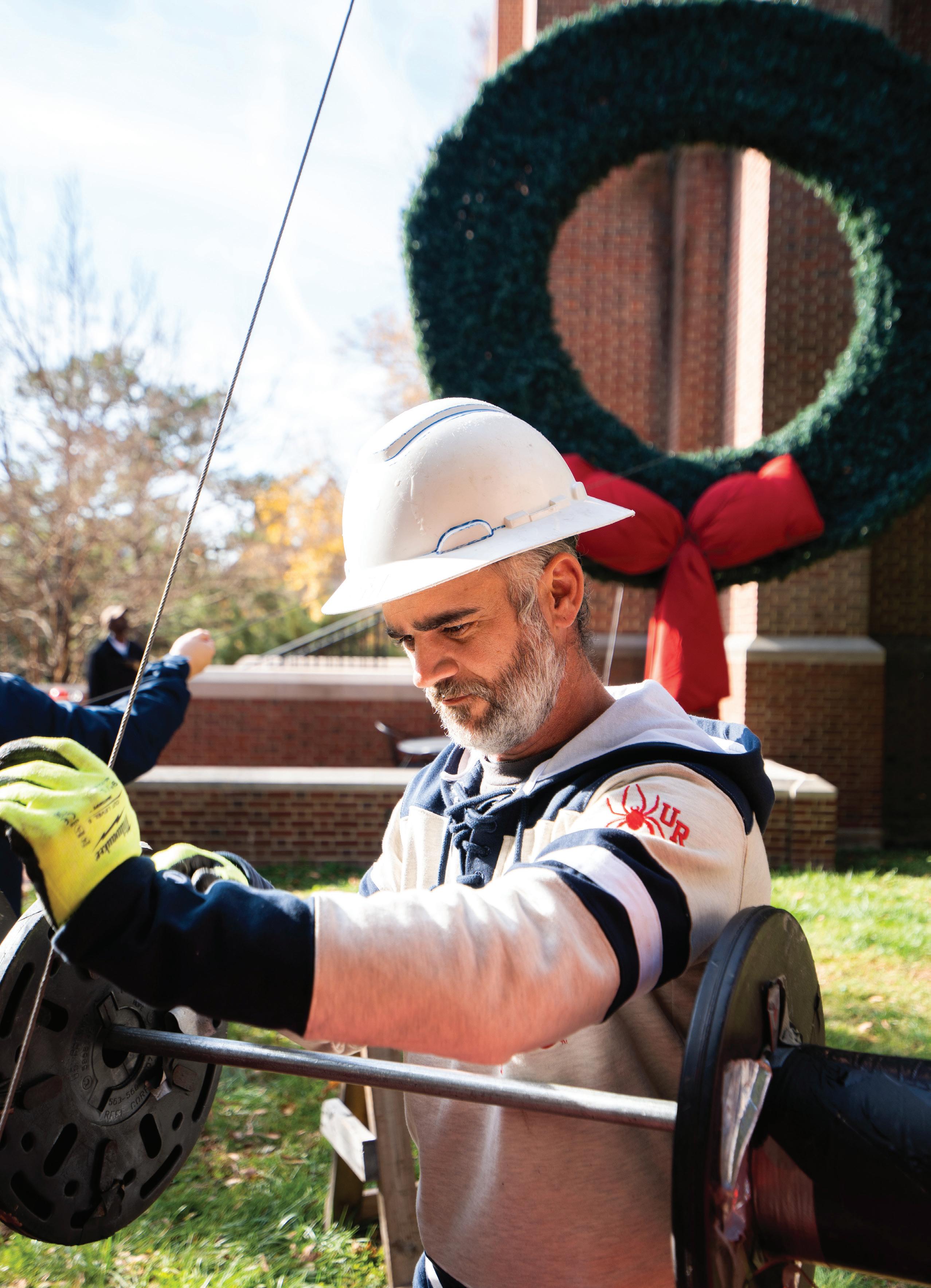
Notes of Excellence
In the Department of Music, students can

Staff contributors: Sunni Brown, Megan Condict, Catherine Amos Cribbs, Matthew Dewald, Nicole Hansen, Paul Heltzel, Terrance Henderson, Kevin Heraldo, Alicia Hubbard, Pamela Lee, Katie McBride, Kyra Molinaro, Amy Ogle, ’26, Cynthia Price, Gordon Schmidt, Cindy Smith, Greg Thompson, David Vinson,
Spider Insider is printed on paper that is FSC® certified, with 10% post-consumer recycled content and certified fiber.
ON THE COVER
The Office for Sustainability has led UR’s efforts to reduce campus carbon emissions by 70% since 2009 through efforts such as electric vehicle chargers, solar panels, and the Rethink Waste program. Read the story on Page 14.
Illustration by Katie McBride
@richmond.edu.
2 Strengthening Our Community Message from President Kevin F. Hallock 3 Spider Philanthropy Spiders
Day strengthen UR’s giving culture 4 Building Partnerships Facilities staff support the academic mission through faculty, student collaborations 6 Jepson and SPCS Celebrate Major Anniversaries Media Mentions 7 Like Home for the Holidays Staff and faculty make spirits merry and bright for oncampus students during the holidays 8 Curated Experiences University Museums renews focus on creating campus connections 10 Accolades Community-Engaged Global Learning International Education Week celebrates New Zealand 11 The Conversation Why does money exist? 12 Spider Dash Learn more and register for UR's inaugural Spider Dash 5k 14 Sustainable Together Efforts accelerate pace to carbon neutrality 15 Increasing Student Success Academic Skills Center provides a tailored approach to student learning
communications
marketing
communications
Helping Spiders, Gratitude
Vice president for
and
Tom Addonizio Associate vice president for
and digital engagement Phillip Gravely Editor Cheryl Spain Senior director of creative services Samantha Tannich Graphic designer Ashley Hill Photographer Jamie Betts
and Michael Warchol
your
PEOPLE 16 Visual Leaders 18 Our Accomplishments 20 Custodial Award Winners 21 New Hires, Moves, and Retirements 23 Engage for Change Award Winners 25 In Memoriam
We welcome
input. Send your story ideas or comments to spiderinsider
participate in 16
AROUND THE LAKE Winter 2023 Spider Insider
ensembles ranging from the symphony orchestra and chorale groups to gamelan and West African drumming.
Photograph by Jamie Betts
STAY CONNECTED
Read more of President Hallock’s messages to the University community — or share your thoughts or ideas with him at any time — at president. richmond.edu.
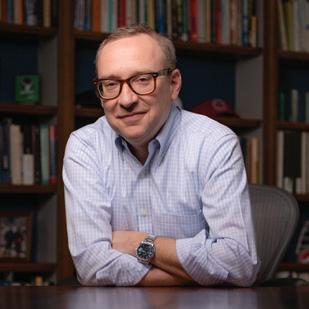
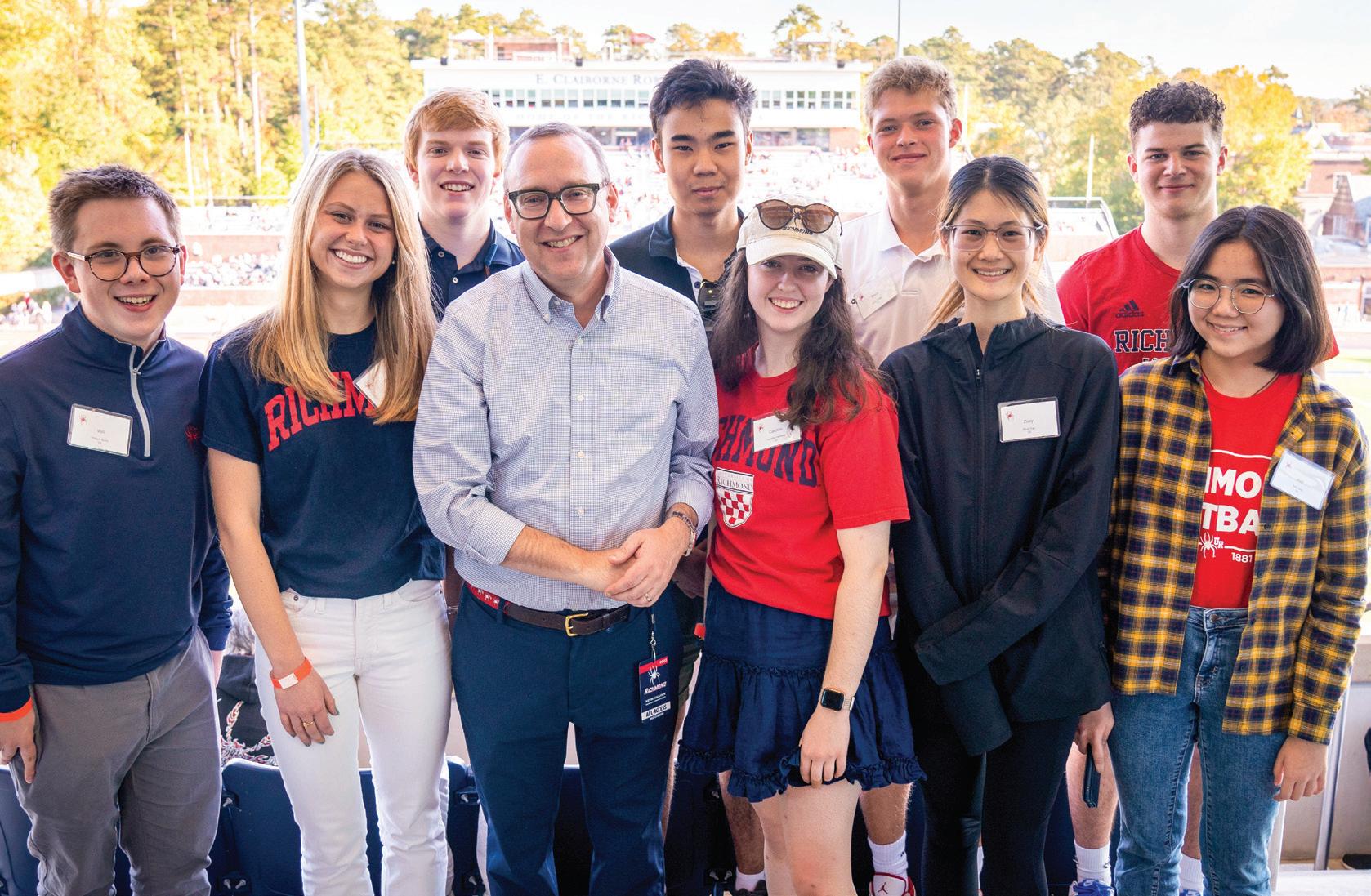
Strengthening Our Community
Dear Colleagues,
It’s a new calendar year and a new semester, and I even have a new hip — I had one replaced in December. As I reflect on what we accomplished together in 2022 and what we hope to achieve in 2023, I am particularly grateful for how we all help to build, support, and strengthen our campus community.
From cheering on Spiders at athletic games, artistic performances, and pitch competitions to listening to one another’s concerns and needs to stepping up on special occasions to bring one another in — we build our community by connecting with one another. As just one example, this year, on the day before Thanksgiving, our Dining Services team prepared a bounty of warm and delicious food and, in partnership with the Office of the Chaplaincy, created a “home-away-from-home” atmosphere. Students, staff, faculty, and family volunteers dined together at small round tables graced with table linens, placemats, and centerpieces. It was awesome.
In December, three 14-foot wreaths again adorned Boatwright Tower, 85 feet in the air. With 1,400 white lights per wreath, it took teamwork and over 1,500 feet of cable to balance and hoist the evergreen beacons into place. This cheer, visible across campus, is just one shining emblem of the work going on to
support our community by making our campus an incredible place to be. Our staff keeps our 378-acre campus clean, safe, and beautiful; takes worries and work orders off our plates; provides psychological support; secures financial resources; and develops opportunities for Spiders to thrive.
Finally, we strengthen our community by working together to envision and shape Richmond’s future. This year, our staff and faculty have worked incredibly hard to develop a new general education curriculum informed by student interests and demand, slated to launch in 2024. I’ve also been heartened to receive hundreds of suggestions from students, staff, faculty, alumni, parents, and friends for how to make Richmond more remarkable as we gather momentum around our guiding lights. And we’ve heard calls to increase our diversity and to redouble our efforts in equity and inclusion. I am grateful to be part of this community and for your partnership as we chart our path forward. Please continue to take care of yourself and look out for others.
2
With gratitude, Kevin F. Hallock President
President Hallock and students from his first-year seminar, Pay, posed for a picture during the Oct. 15 football game against the Villanova Wildcats.
Spider Philanthropy
Spiders Helping Spiders, Gratitude Day strengthen UR’s giving culture
In the fall, the UR Advancement Office hosted two campuswide initiatives to engage the Spider community in philanthropy.
As part of the third annual Gratitude Day on Nov. 3, students, faculty, and staff gathered on the University Forum to celebrate the generosity of donors. Participants wrote down their words of appreciation on notecards that were displayed on a large web and recorded video messages that will be used to thank donors. The messages ranged from gratitude for a faculty member to receiving a scholarship.
“Gratitude Day is an opportunity to recognize and celebrate the impact that donor giving has had on all facets of our Spider community,” said Rachel Hill, assistant director, donor recognition and experience. “It’s also a way to educate students about what philanthropy means and how it affects our entire campus.”
The fifth annual Spiders Helping Spiders campaign was held Nov. 15–22, raising more than $345,000 to support students with financial need. Gifts are directed toward financial aid; the Student Emergency Fund, which helps students who experience urgent and unforeseen expenses; and the Career Opportunity Fund, which provides students financial assistance to pursue internships, job interviews, or graduate school.
This year, each of these areas exceeded its goal, thanks in part to generous matching gifts from Spider alumni and families. International donations spanned the globe from the UK to China. And, out of the 844 total campaign participants, 128 were first-time donors to UR.
“Spiders Helping Spiders goes to the heart of who we are as a community and what we strive to be as a university,” said Kim Lebar, director of annual giving. “Life isn’t always fair or easy, but we want to level the field where we can for students of limited means. Sometimes, that means help buying a ticket home to see a sick parent or buying a suit for an internship. Every gift during Spiders Helping Spiders directly helps students when they need a hand.”
The 2023 UR Here Giving Day will be held April 4–5 to support funds that help make Richmond affordable for all students and enable UR to offer students the personal care, experiences, and academic excellence for which Richmond is known.
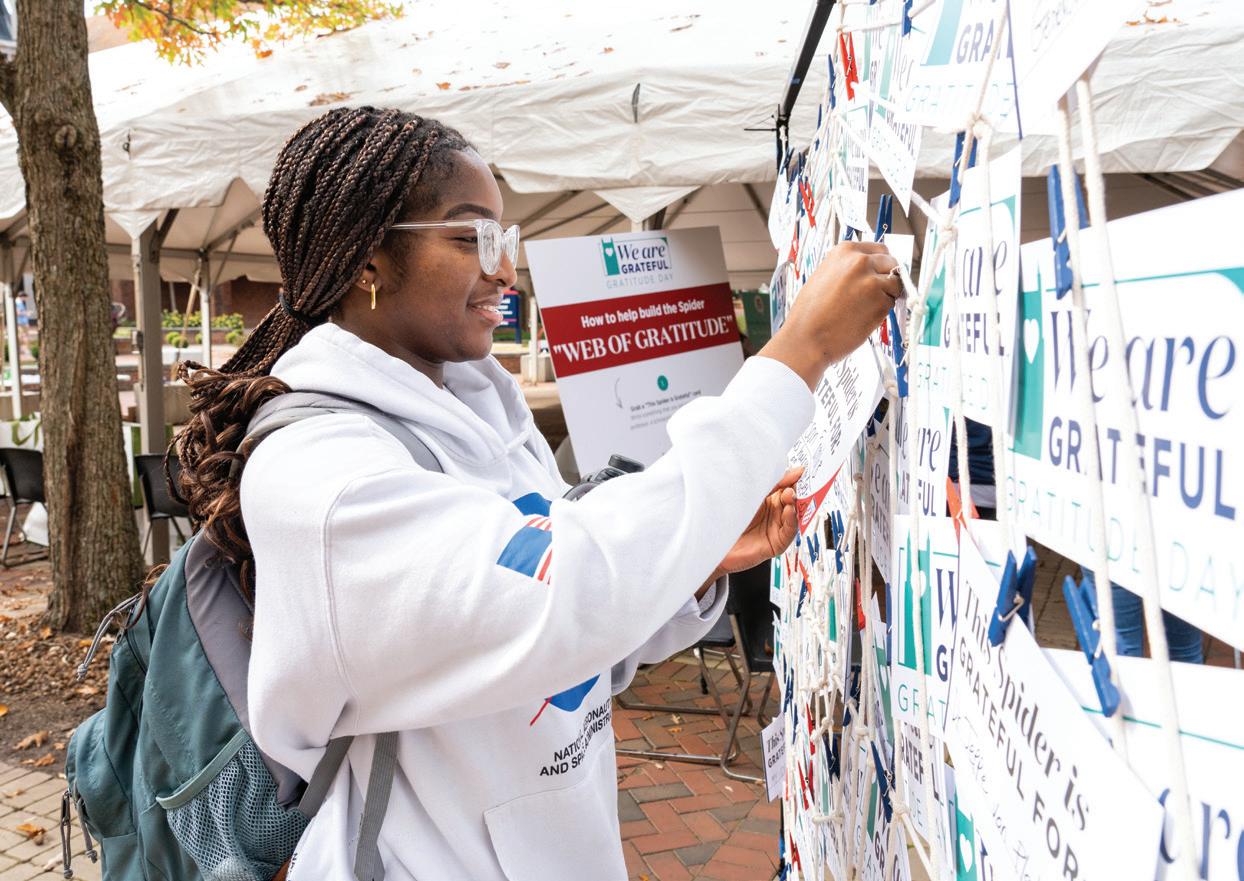
SOCIAL BUZZ
This ranking is a natural outcome of the thoughtful and steady investment the university has made in supporting quality of education and experience for its students. It shows prospective families what alumni know firsthand: that UR is an incredible living and learning foundation on which to build and shape one’s future. Go Richmond go!!! Keep climbing that ladder!! —Lindsay Shore Hanson via Facebook Referring to UR’s move into the top 20 in the 2022–23 U.S. News & World Report rankings
Omg!! I remember her. She was never my professor but we’d always have a nice conversation whenever we ran into each other. This post made me smile. So happy for her.
—Wadia Samadi via Facebook


Referring to professor Lidia Radi being awarded a fellowship to study Italian transnational literature
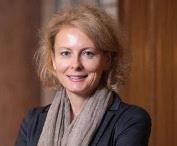
I worked out many problems walking around Westhampton Lake not only when I was a student there but also after I graduated!! Peaceful!! Thank you, U of R —Pamela Fay-Williams via LinkedIn

My son was lucky to be a part of this class! It was an incredible learning experience for him and his classmates! —Patty Beech-Dziuk via Facebook
Referring to professor Carrie Wu’s desert ecology course visit to the Mojave and Sonoran deserts to conduct field-based research, study microhabitats, and meet with scientists
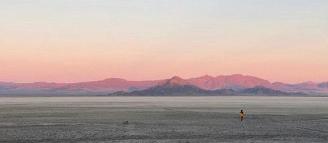
Loved living in North Court! All the way up in “the rat’s nest”!!
—Katie Minister via Facebook
Connect with us on Facebook, Twitter, and Instagram: @urichmond
AROUND THE LAKE 3
“Life isn’t always fair or easy, but we want to level the field where we can for students of limited means . ”
Facilities staff designed and built enclosures to support faculty research on moths and rats.
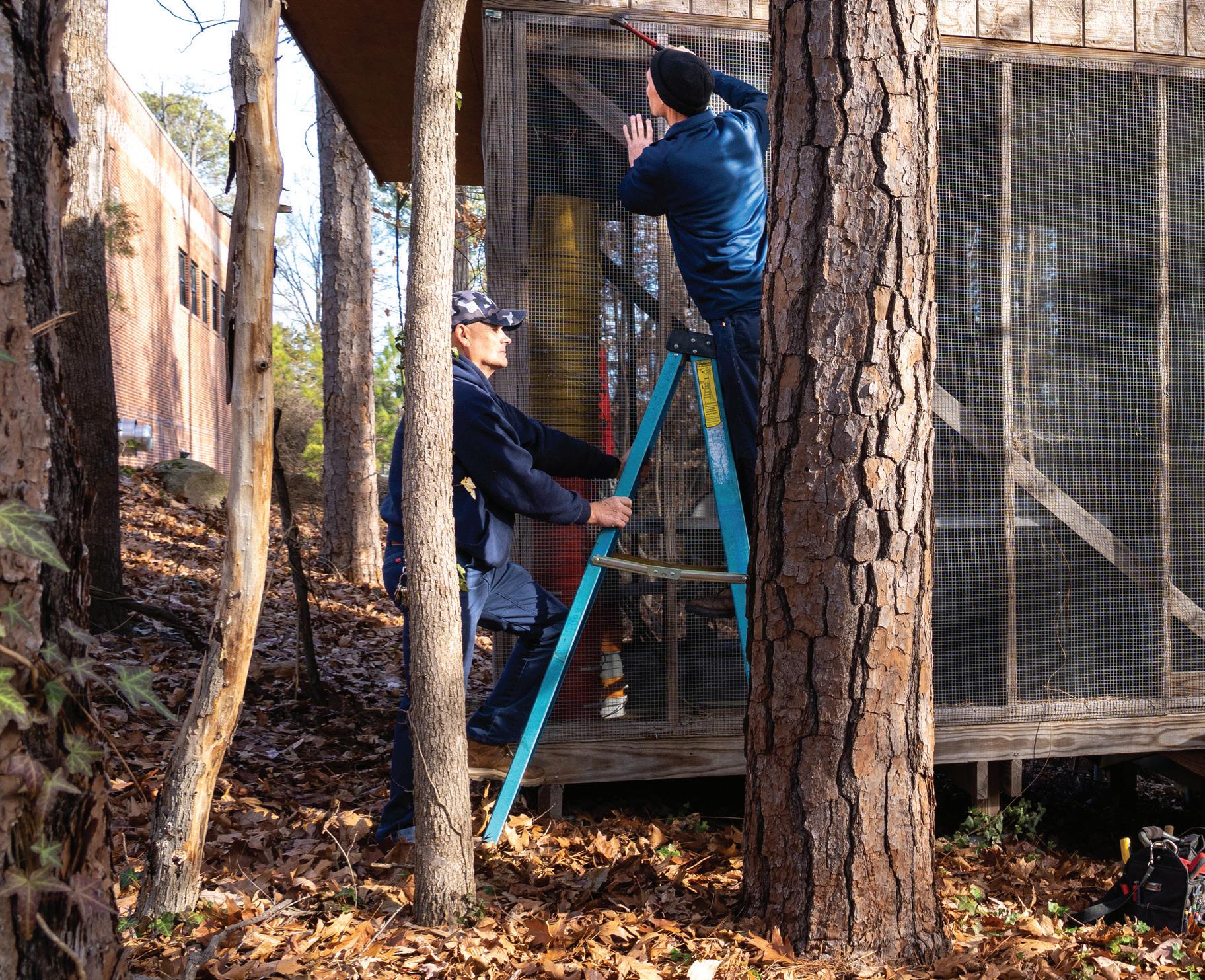
HISTORY OF SUPPORT
Facilities has long supported academic projects, and the sciences are a repeat customer. Over the years, the team has built the platform allowing access to the planetarium on the roof of Gottwald, fenced the area around the campus beehives, and created special plexiglass with netting and screens for a project related to mosquitoes.
But one of the largest academic projects facilities has assisted with was out of the arts. In 2014–15, “the Parking Lot Project,” led by the Department of Art and Art History, transformed a parking lot on campus into a yearlong, collaborative work of art. Facilities worked with faculty and students to build structures and redevelop the spaces as sites for independent research and public art.
Building Partnerships
Facilities staff support the academic mission through faculty, student collaborations
Last spring, professor of English Elizabeth Outka wanted to highlight the intersection of literature and nature for one of her courses. To make the nature part more real, she turned to University Facilities for help.
“Working with the fabulous landscape team, we sowed wildflowers and planted other plants using compost in the form of tiny fragments of 100% unbleached recycled paper that we wrote some of our favorite poems on,” said Outka.
The class, hosted in the Eco-Corridor, was a way for her Art (and Nature) Amidst Adversity students to enrich the conservation area while connecting with others. Staff, students, and faculty worked alongside each other to dig, plant, and mulch the area.
“Our gardeners have planted all kinds of things on this campus, but I can’t say we’ve ever planted a poem,” said Allison Moyer, associate director of landscape services and horticulture. “It was such a fun project, and we appreciated the opportunity to support the English department and participate in a class hosted outside on our beautiful grounds.
“Since we don’t work with students daily, these opportunities help remind our landscape staff why we are ultimately here,” Moyer added.
From maintenance and construction to planting and mowing, the more than 200
employees in University Facilities keep the buildings and grounds looking beautiful and the institution operating at the highest caliber. They also support and enhance the academic mission of the University by assisting faculty and students with projects for their classes and research.
Last fall, the Department of Latin American, Latino, and Iberian Studies (LALIS) and University Museums called on custodial services staff for help with an exhibition by Latinx artist Jay Lynn Gomez focusing on the value of domestic workers and domestic and care work. Custodial staff shared their impressions on the art and its layout and provided comments and opinions that were integrated into the exhibition’s educational initiatives, catalog, and informational panels. The exhibition, “Jay Lynn Gomez: Domestic Scenes Reconsidered,” opens Jan. 23.
Exhibition co-curators Martha Wright and Karina Vázquez pointed out the importance of incorporating UR custodial and cleaning staff employees’ views on the art as a “way to honor both the art and campus workers by creating an exhibition that opens paths for dialogue, curiosity, reflection, and recognition.”
“The encounter with facilities employees offered an opportunity for talking about the
4
vital energy involved in a work that implies much more than keeping up cleanliness and beauty of physical spaces, and for exploring the meanings of work and working time,” said Wright and Vázquez.
In the wooded area just outside the Gottwald Center for the Sciences, a research space built by facilities supports work on certain species of interest to UR science faculty.
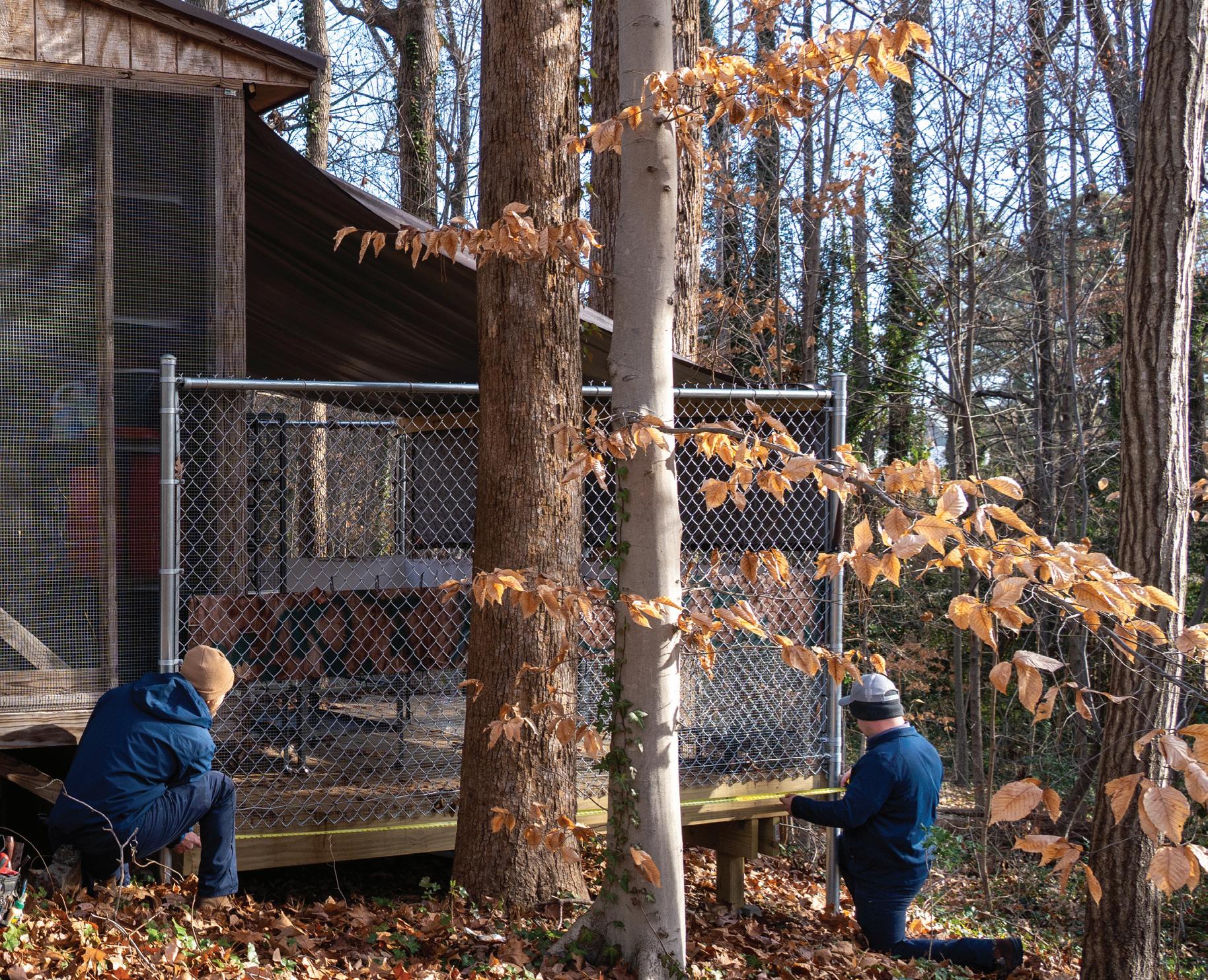
Biology professor Kristine Grayson studies the ecological impacts of the invasive European spongy moth. She partnered with design and construction teams to build a custom insect research pavilion to raise and study the caterpillars.
“When studying an invasive species spreading into new areas, it is important to run experiments under natural environmental conditions but in secure locations safe from accidental escape or disturbance,” Grayson said.
“The research pavilion has supported numerous projects to understand how this species will grow under the hot Richmond climate, and several student projects have been possible because we have a protected space on campus for outdoor experiments.”
Facilities also built an addition to the enclosure this past summer to support another research project involving animals of the four-legged variety.
“When Kelly Lambert in psychology and I wanted to team up to combine our wild and lab rat research into a new project, we needed a space on campus that was outside of typical indoor lab facilities but still close enough that we could work with students to conduct observations of natural behaviors,” said biology professor Jonathan Richardson. “The facilities team was great about thinking through options that would meet our research needs.”
Paul Lozo, director of facilities operations, said his team enjoys tackling academic projects.
“The team really does like to do it, and it breaks up some of the more routine tasks that we are also responsible for, like fixing a sticking door or repairing a leaking faucet,” Lozo said. “What makes it really enjoyable is the students are charged with a project, and they know the end goal, but they don’t know how to get there. We help with that part. Our team loves to think through their ideas and help them achieve their goals.
“Many students aren’t even aware that facilities exists, or we are in the background, and they have no idea how many talented and dedicated people we have,” Lozo added. “We all love to apply our skills to supporting faculty and students.”
INSTRUMENTAL SERVICE
The Dining Services team also supports academic endeavors on campus, including Bench Top Innovations, an entrepreneurial course mentored by marketing professor Joel Mier. Students collaborate to create and commercialize a packaged food idea. The inaugural year resulted in Absurd Snacks, a chickpeabased trail mix now purchasable online and at 20 locations around Richmond.
Dining services worked with the class on kitchen safety protocols, sanitation standards, food procurement, and training for the kitchen equipment.
“The UR Dining Services professionals were instrumental in our ability to even develop the program,” Mier said. “The ability to not only be able to develop and prototype product in our kitchens, but to have our amazing chefs make time out of their day to help the teams in their journeys is absolutely priceless.”
AROUND THE LAKE
5
“Our team loves to think through their ideas and help them achieve their goals.”
JEPSON AND SPCS CELEBRATE MAJOR ANNIVERSARIES
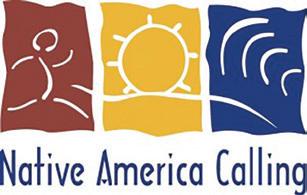
2022 marked major anniversaries for two of the University’s groundbreaking institutions — the Jepson School of Leadership Studies and School of Professional & Continuing Studies.
Founded 30 years ago as the nation’s first undergraduate school dedicated to the study of leadership, the Jepson School has been preparing its students for positions that drive real change in their communities and the world.
“By teaching for and about leadership, we provide tremendous benefits to society,” said Dean Sandra Peart. “Our democracy needs moral and effective leaders. So, too, do our businesses, nonprofits, schools, hospitals, theaters, and sports teams.”
MEDIA MENTIONS

Law professor JACK PREIS was quoted in “Youngkin’s restriction on trans students’ rights is probably illegal, experts say.” Preis argued Gov. Glenn Youngkin’s policies requiring schools to categorize transgender students by their biological sex could possibly be issued due to the state laws’ vague language but probably fail for other reasons. “Privacy rights are going to prevent many teachers from even knowing whether or not they are teaching a trans student.”
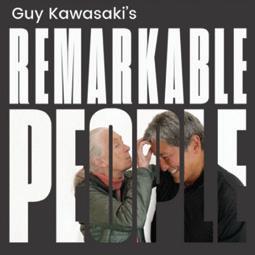

ERIK NIELSON, liberal arts professor, was quoted in “Young Thug: How rap lyrics put a rapper behind bars” on the use of rap lyrics as evidence in criminal trials, a growing practice. Nielson said the threatening and prejudicial lyrics allow prosecutors to “play upon, but also perpetuate, the stereotypes that many jurors [and judges] hold about the criminality of young black men,” even when there’s no physical evidence linking them to a crime.
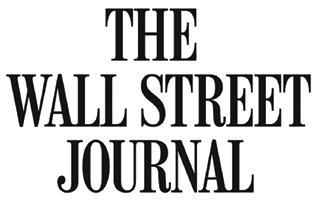
“The Dust Bowl and Native Displacement” featured leadership studies professor DAVID WILKINS, who explained government policies during the Dust Bowl and their negative effects on Native Americans. “Many Indians … had been made landless because of policies … and native peoples had lost their allotments through various fraudulent actions by state officials and local officials,” Wilkins said. “It was a really dark, very dark period.”
On Sept. 17, approximately 160 Jepson students, alumni, and faculty members gathered to celebrate the milestone by reflecting on its past and anticipating its future. Speakers included the school’s namesake and lead benefactor, Robert S. Jepson Jr., B’64, GB’75, and H’87; President Kevin Hallock; and Peart.
“Our ambitions know no bounds,” Jepson said, “for we intend to be unique and remain among the very best.”
Founded in 1962 and rooted in former president Frederic Boatwright’s desire to provide higher education opportunities to working adults and former president George Modlin’s vision to create a University division dedicated to nontraditional learners, SPCS has been bringing the community to the classroom for 60 years.
Through undergraduate and graduate degree offerings, professional certificates, and noncredit classes and outreach programs, SPCS serves over 3,000 students in the greater Richmond region and beyond in fields as varied as educational leadership, political campaign management, and information systems.
“From the start, our programs have been career-focused, preparing students for growth and advancement as well as career changes,” said Dean Jamelle Wilson. “We understand the power of education to change the trajectory of one’s life and are committed to helping employers and employees meet the workplace challenges of today and tomorrow.”
For more information about these milestone celebrations, visit jepson.richmond.edu and spcs. richmond.edu.
“Inconsistent Fall Foliage Leaves Travelers Guessing on Finding Peak Colors” quoted geography and the environment professor STEPHANIE SPERA. The article discussed how drought conditions in 2022 impacted the timing of leaves achieving peak fall color, which Spera studied in Acadia National Park. Spera said, “For every degree Celsius warmer in September, [fall color change is] about 2 ½ days later.”
Biology professor EUGENE MAURAKIS was a guest on Season 2, Episode 37 of the U.S. Fish & Wildlife Service podcast “Fish of the Week.” He discussed species of fish that are nest builders and their relationship to the ecosystem. “[Fallfish are] architects. They’re engineers. … They are a convener of community,” Maurakis said. “The most important point is that they are keystone species, and so realizing their importance, because once a keystone species dies off or is extirpated from an area or becomes extinct, then it brings down a whole community with it.”
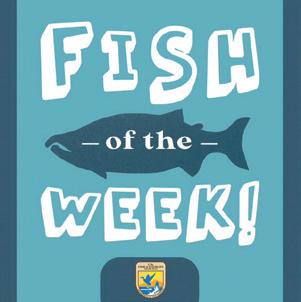
“Figuring Out the FAFSA: Everything You Need to Know Before Getting Started” quoted KATHRYN OWENS, senior associate director of financial aid. The article explains the purpose of the FAFSA and offers tips for how to complete it. “Some schools require additional applications for their institutional financial aid,” Owens said, “Be sure to check with each school for the required applications and deadline dates.”
ELISABETH GRUNER, English professor, was a guest on the podcast “Guy Kawasaki’s Remarkable People.” On the episode, titled “Elisabeth Gruner: The Zen of Writing, Reading, and Learning,” they discussed Gruner’s approach to “ungrading” and finding pleasure in learning how to write through editing and revisions. “Grades turn things into prizes and punishments and take away the pleasure of the learning itself,” Gruner said. “But if you take away the prize and the punishment, you get to experience the pleasure of it a lot better.”
Visit news.richmond.edu to view additional media mentions or connect with University Communications’ Media and Public Relations team, Cynthia Price and Sunni Brown.

6
“By teaching for and about leadership, we provide tremendous benefits to society.”
Like Home for the Holidays
Staff and faculty make spirits merry and bright for on-campus students during the holidays
Thanksgiving and winter breaks are a time for many students to return home to de-stress and reconnect with family and friends while celebrating all the holiday season has to offer. For some students, however, returning home is not an option. At the end of each fall semester, about 80 students remain on campus — staying in their own rooms — during the extended breaks. Whatever their situation, the University strives to provide an environment complete with special touches of the holidays.
On the Wednesday of Thanksgiving week, the Chaplaincy and Dining Services offer a special Thanksgiving lunch in the Heilman Dining Center for students who remain on campus.
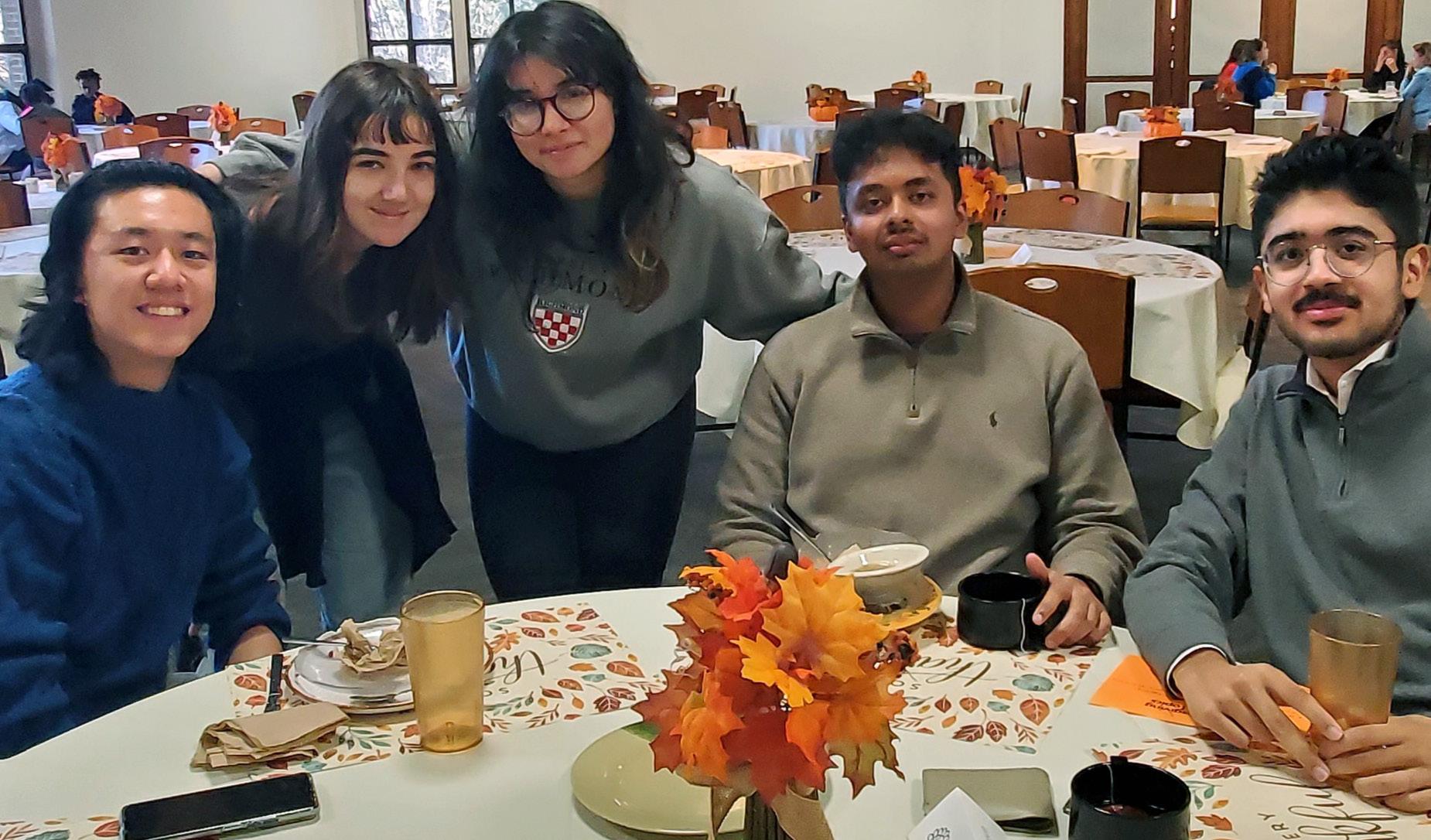
“Dining makes it quite special with themed decorations and a full Thanksgiving meal with turkey, dressing, mashed potatoes, mac and cheese, and all the holiday favorites — along with dessert,” said Terry Baker, executive dining director.
Since most Thanksgiving meals have plenty of leftovers, students are offered takeout boxes so nothing goes to waste. Dining Services even provides a takeout breakfast option for the next day.
Each year, 15 to 20 faculty and staff volunteer at the Thanksgiving lunch, welcoming the students and sharing a meal and conversation.
“It creates a really wonderful family atmosphere, and the entire event feels very warm and cozy,” said Jamie Lynn Haskins, chaplain for spiritual life and communications director for the Chaplaincy office. “We do all we can to make sure students feel loved and supported over the holidays.”
At the start of winter break, International Education hosts a holiday card and letter-writing activity with holiday treats and drinks for students who want to send a prepaid postcard or letter to their friends and families overseas. And for students who enjoy cooking their own meals during the break, Dining Services stocks Westhampton Deanery kitchen with pots, pans, and other kitchen staples. Students can also use GroupMe, a group text messaging app, to find other students on campus to meet up with for socializing.
For facilities, the UR Police Department, and the on-call staff who care for the students during the holidays, safety is always of the utmost importance. Staff know which students will be on campus and provide them with updated bus schedules and information on campus resources and emergency services in advance of their stays.
“We want to ensure they have everything they need,” said Patrick Benner, director of residential life. “We offer a caring touch and provide them with resources and support. We’re all looking out for them.”
’TIS THE
SEASON –TO SHOP
Black Friday is a big day in the United States and traditionally marks the start of the holiday shopping season. This year, the Center for Student Involvement, the Student Center for Equity and Inclusion, and Transportation Services sponsored two shuttles organized by International Education to take students shopping the day after Thanksgiving. They traveled to the Williamsburg Premium Outlets, joining the throngs of shoppers in search of bargains.
“It’s a fun opportunity for our international students to travel off campus for a uniquely American experience,” said Krittika Onsanit, director of international student and scholar services.
AROUND
7
THE LAKE
“We do all we can to make sure students feel loved and supported over the holidays.”
STAFF, TOO Faculty aren’t the only ones who can benefit from personalized opportunities with University Museums; staff can also profit from tours and other curated experiences.
In October, the Enrollment Management team toured University Museums and the Modlin Center for the Arts to see the exhibits and performance spaces firsthand and better understand how the museums and Modlin support student learning, research, and creative exploration.
“This time allowed admission staff to hear student stories to share with prospective and admitted students so we’re better able to represent the arts and arts management,” said Rebecca Buffington, director of admission. “It also helped us understand how students can engage with the museums as we advise admitted students and even current students who work in admission.”
To request a tour, go to museums.richmond. edu/visit.
Curated Experiences
University Museums renews focus on creating campus connections
When the COVID-19 pandemic hit, museums around the world closed their doors — a challenge that some used as an opportunity to reimagine the museum model. At University Museums, closing to the public presented a chance to align resources more strategically with Richmond’s educational mission.
“It was refreshing to sit back and listen,” says Heather Campbell, curator of museum programs. “We were able to figure out what the campus wanted from us.”
And what campus wanted, they learned, was a renewed focus on creating connections with faculty, students, and the academic mission. Museum staff set out to make it happen by working with faculty to make the museum’s spaces and collections more available for curricular uses.
One early partner was Megan Driscoll, assistant professor of modern and contemporary art history, who asked students in her survey course to select a work of art to study and write about and produce a podcast for extra credit.
“The museums staff made the space accessible and helped my students feel comfortable,” Driscoll said. “They put together the wonderful collections and touring exhibitions that gave

students an opportunity to explore artworks in person.”
In her museum studies seminar, Elizabeth Schlatter, interim executive director of museums, partnered with Elena Calvillo, chair of the Department of Art and Art History, to create a cabinet of curiosities. These object collections were first created in the 16th century by European rulers, aristocrats, and scientists, and they served as the precursors to museums.
Students selected a series of objects from the Lora Robins Gallery and arranged them in a cabinet — the left side reflecting a traditional design and purpose of curiosity cabinets and the right exploring contemporary issues of nature conservation and sustainability. The cabinet was also a tool for thinking critically about museums and their role as gatekeepers who decide which objects and stories are collected.
While art history and museum studies are obvious partners, departments such as sociology, classics, leadership, and political science also offer new possibilities, and the sciences can benefit from an extensive collection of natural objects and artifacts in the Lora Robins Gallery of Design from Nature.
Amy Treonis, associate professor of biology,
8
visited the museum with her astrobiology students to view the crystals exhibit and Precambrian specimens. The students spend two weeks discussing the Precambrian fossil record and what it can tell scientists about the beginning of life on Earth — and how that ultimately informs the search for life on other planets.
During their visit, students held a stromatolite, the oldest known macrofossil, pulled out by museum staff specifically for Treonis’ class.
“I had never held a stromatolite in my hands before, and neither had my students,” Treonis said. “To hold a 3.4 [billion years] old rock in your hands makes the antiquity of life on Earth more tangible. It also makes the research more accessible; it makes it seem more like something the students could see themselves doing.”
That kind of tangible contribution to student learning is the goal, Campbell said.
“We work with a lot of different departments to try to figure out ways they can use our collection or our exhibitions to enhance what they’re doing in their classrooms,” Campbell said. “Sometimes it’s not always clear-cut, and we have to be super creative.”
Since exhibitions are planned years in advance, museum staff have plenty of time to reach out to academic departments to make connections between syllabi and museum collections. The museums also have a permanent collection that’s not always on display but can be pulled out. They’re also preparing to unveil a new database that will allow users to better engage with the collection virtually.
“The last two years gave us time to reflect on what was working and what wasn’t,” Schlatter said. “There are a lot of opportunities for experimentation without having to say, ‘This is how we’ve always done it.’”
Moving forward, Schlatter and Campbell hope to work with more departments. For instance, students in a Spanish language class could be tasked with describing a set of objects from the collection, giving them an opportunity to practice their vocabulary. While the galleries have set hours of operation, they are happy to accommodate visitations outside of that schedule. They encourage interested faculty to reach out.
“Our mission is to support the educational mission of the institution,” Schlatter said. “We exist for the campus community first. That’s the purpose behind everything we do.”
Anne Taylor Rawls, communications and events specialist in Human Resources, and other campus communicators toured the Joel and Lila Harnett Museum of Art in October to learn more about its mission.
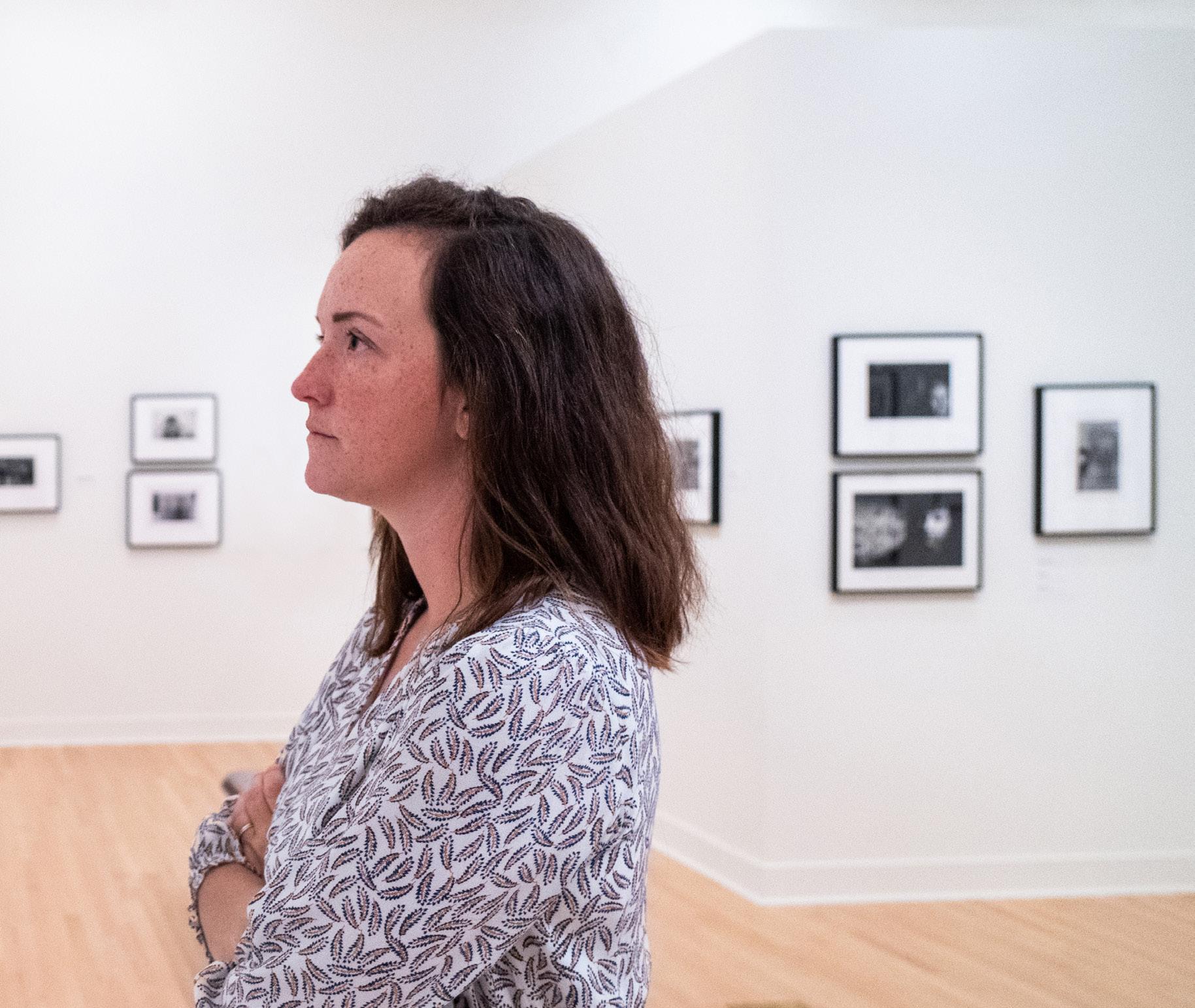
AROUND THE LAKE
PLAN YOUR VISIT University of Richmond Museums comprises the Joel and Lila Harnett Museum of Art, the Joel and Lila Harnett Print Study Center, and the Lora Robins Gallery of Design from Nature. They’re all free and open to the public — no appointment necessary — and make wonderful lunchtime or afternoon break options.
For information on hours of operation, go to museums.richmond. edu/visit. Please note that the Lora Robins Gallery of Design from Nature is closed for renovation until fall 2024.
9
“Our mission is to support the educational mission of the institution.”
ACCOLADES
U.S. News & World Report ranked UR No. 18 among national liberal arts colleges in its 2022–23 “BEST COLLEGES” guide, the highest ranking the University has received from the publication. UR also climbed one spot to No. 15 on the “MOST INNOVATIVE SCHOOLS” list, which highlights colleges that are making the most innovative improvements within curriculum, faculty, students, campus life, technology, or facilities.
The Howard Hughes Medical Institute awarded UR a $625,000 INCLUSIVE EXCELLENCE 3 GRANT to support efforts to create an inclusive experience for students and enhance student belonging. The six-year program will be led by Angie Hilliker, associate professor of biology, who will work with faculty collaborators across STEM disciplines to implement the project.
The Princeton Review ranked UR No. 21 in the nation for environmental stewardship in its 2023 edition of the “GUIDE TO GREEN COLLEGES.” While UR has been included in the guide for more than a decade, it’s the first time UR has made the Top 50 list.
The Commission on Accreditation for Law Enforcement Agencies awarded the University of Richmond Police Department LAW ENFORCEMENT ACCREDITATION for the 10th time. URPD was the first department at any priviate institution to receive CALEA accreditation and has retained its accreditation longer than any other university law enforcement agency.
Fast Company named the University of Richmond School of Law’s Legal Business Design Hub the winner in the “Learning” category of its 2022 INNOVATION BY DESIGN AWARDS The hub, launched in 2020, is an academic and cocurricular program focused on creating innovative business models that improve the reach and effectiveness of legal services.
The U.S. Department of Justice’s Office of Community Oriented Policing Services awarded the University of Richmond Police Department an $85,508 LAW ENFORCEMENT AGENCY DE-ESCALATION GRANT. The funds will further URPD’s mission to build and foster stronger relationships to ensure a safe campus environment.
The Virginia Commonwealth University Collegiate Recovery Program has awarded UR a $25,000 GRANT — funded by the Department of Behavioral Health and Developmental Services — to enhance the Spiders Support Recovery program, which provides peer-led support and activities for students in recovery from substance use disorder. It’s the second grant awarded by the program, for a total of $75,000 to date.
Community-Engaged Global Learning
International Education Week celebrates New Zealand
Cast a wide net and hope for a bountiful pre-pandemic-style catch — this was the approach for the 2022 celebration of International Education Week, or IE Week. Spoiler alert: It worked.
In early 2022, the Office of International Education settled on New Zealand as a focus based on where UR has intriguing study abroad presences and on what Martha Merritt, dean of international education, learned in conversations with faculty and staff. Identifying the place was only the first step. The next was soliciting even wider input. A message went out to campus: “Let us know if you have inspiration.”
Within minutes, messages came in. “I have given talks on the flora and fauna of New Zealand,” one faculty member wrote. Another offered, “We have three classes in our department with ample room for case study and a unit on gender/politics/women’s leadership.” A staff member remembered an early 2000s exchange student from New Zealand who now works at the embassy in Washington, D.C. — a great contact. Someone sent travel photos. All of them widened the possibilities.
Begun in 2017, IE Week is International Education’s largest on-campus programming initiative. Past celebrations have focused on Denmark, South Africa, East Asia, India, and Chile, expanding along the way to include representation from all five schools and participants from every corner of campus, including dining, facilities, well-being, and many others. During the height of the pandemic, the programming went virtual and received a national award for innovation.
Suggestions for 2022 programming raised a lot of possibilities — and questions. Who on campus plays cricket? How do we persuade a partner institution to send faculty and help cover costs? Can UR’s electricians arrange lighting for the sheep?
The conversations with overseas partners also prompted a revision to what was initially called New Zealand Week. It became Aotearoa New Zealand Week. The addition of the Māori name of the country better recognized the nation’s Indigenous culture and expanded ways to engage with it. Programming eventually included 20 stations on everything from business case studies and biodiversity to Proper Pie and Bodypump, a New Zealand fitness regimen. New Zealand’s ambassador to the United States, Bede Corry, gave a talk and then dined on lamb and mussels in Heilman Dining Center.
“We continue to be impressed by the faculty, staff, and students who answer the call each year in a shared commitment to learn more about the world,” Merritt said. “The work of our Spider community brings IE Week to life.”
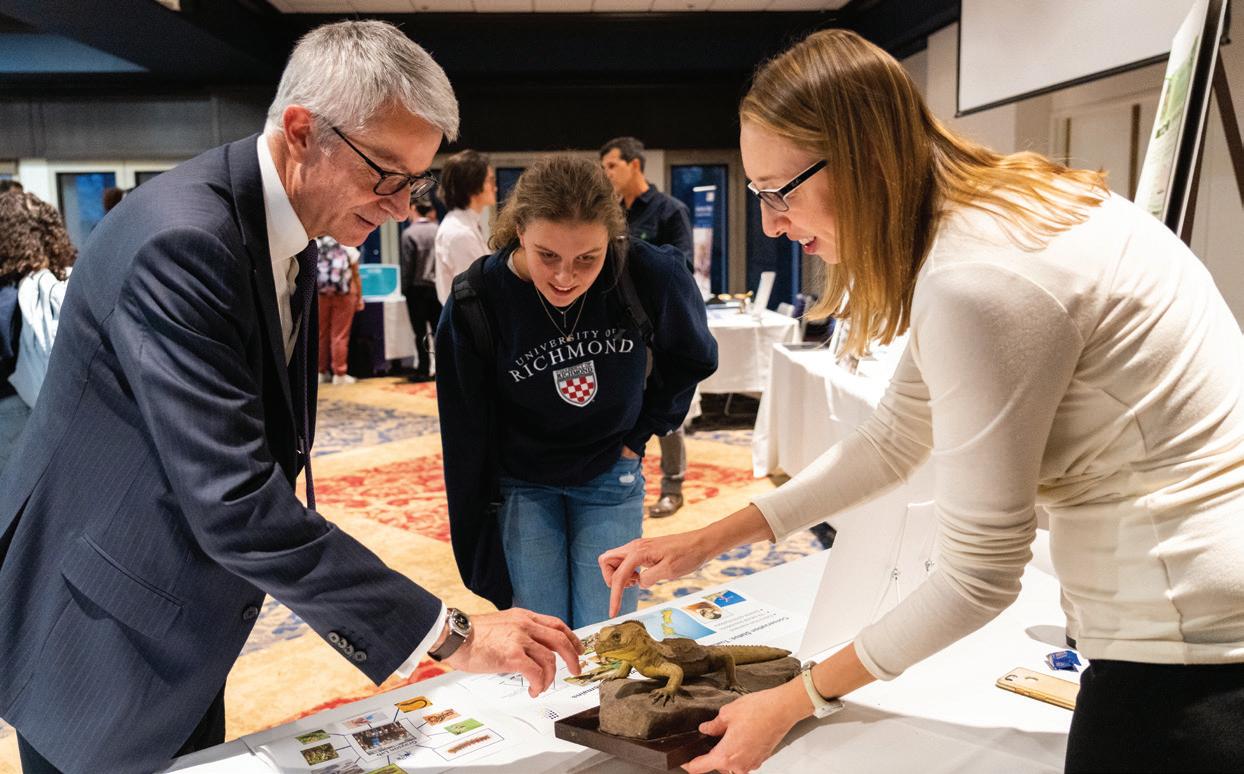
10
Why Does Money Exist?
Imagine a world without money. With no way to buy stuff, you might need to produce everything you wear, eat, or use unless you could figure out how to swap some of the things you made for other items.
Making a simple chicken sandwich would require raising your own hens, growing your own vegetables, baking your own bread, and even collecting your own seawater to make salt.
Maybe you don’t have to produce everything, and instead of using money, you could barter.
But bartering many goods is not easy. Let’s say you’re a carpenter who makes chairs, and you want an apple. You would probably find it impossible to buy one because a chair would be so much more valuable than that single piece of fruit. And just imagine what a hassle it would be to haul several of the chairs you’ve made to the shopping mall in the hopes of cutting great deals through barter with the vendors you’d find there.
Economists like me believe that using money makes it a lot easier for everyone to specialize, focusing their work on a specific activity.
A farmer is better at farming than you are, and a baker is probably better at baking. When they earn money, they can pay others for the things they don’t produce or do.
People have traded goods and services with one kind of money or another, whether it was
trinkets, shells, coins, and paper cash, for tens of thousands of years.
Money makes everything easy. You don’t have to produce all your own goods, and you don’t have to carry your ware to trade. As a carpenter, you could sell a chair for, say, $50. You could then take that $50 bill to a supermarket, buy two pounds of apples for $5, and keep the $45 in change to spend on other stuff later.
Another advantage money has over bartering is that you can use it more easily to store your wealth and spend it later. Stashing six $50 bills takes up less room than storing six unsold chairs.
Nowadays, of course, many people pay for things without cash or coins. Instead, they use credit cards or make online purchases. Others simply wave a smartwatch at a designated device. Others use bitcoins and other cryptocurrencies. But all of these are just different forms of money that don’t require paper.

No matter what form it takes, money ultimately helps make the trading of goods and services go more smoothly for everyone involved.
By Saif Mehkari, associate professor of economics
AROUND THE LAKE
JOIN THE CONVERSATION

This article has been adapted with the author’s permission from an original article that appeared in The Conversation in September 2022. Mehkari’s article was republished by nearly 50 media outlets, including Yahoo! News, the Houston Chronicle, and the News & Record of Greensboro, North Carolina.
Read this article and others written by UR faculty at news.richmond. edu/placements/ conversation.
Contact Cynthia Price at cprice2@ richmond.edu or Sunni Brown at sbrown5@ richmond.edu to learn more about The Conversation and other media opportunities.
11
THE CONVERSATION
Maybe you don’t have to produce everything, and instead of using money, you could barter.
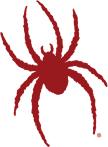
SCHOLARLY SUSTAINABILITY
The sustainability minor — offered for the first time in 2022 by the Department of Geography, Environment, and Sustainability — provides students an opportunity to explore aspects of sustainability in environmental, economic, and social contexts. Students in the minor study core sustainability concepts, research the impacts of human action on people and the planet, and develop solutions to complex sustainability challenges. Students must apply their knowledge via a cocurricular experience that might include an internship, volunteer work, research, or even study abroad.
The sustainability minor is a significant opportunity for students because “it has relevance to every major, and I think it’s got appeal to a lot of different types of people,” said Rob Andrejewski, director of sustainability.
Learn more about the sustainability minor at sustainability. richmond.edu.
Sustainable Together
Efforts accelerate pace to carbon neutrality
When Spider Exchange, UR’s free consignmentstyle shop, was introduced to the campus community in January 2022, David Donaldson, Rethink Waste manager, almost immediately got the kind of feedback he was hoping for.
“I had a staff member come up with the reusable shopping bags from a grocery store — a couple of those,” Donaldson said. “And she had to go back to the car and get another one, she had so much stuff she’d found there.”
Spider Exchange, an expansion of a former office supply exchange, includes gently used clothing and other personal items such as books, kitchen tools, water bottles, and electronics.
It’s a way for faculty, staff, and students to reduce waste while saving money. It’s part of an initiative known as Rethink Waste, which is just one of the current focus areas for the Office for Sustainability.

Since 2009, the office, led by director of sustainability Rob Andrejewski, has helped reduce the University’s carbon emissions by 70% — surpassing its 2035 goal of 65% and well on its way to accomplishing its goal of carbon neutrality by 2050. The progress comes from efforts such as electric vehicle chargers and solar panels, the creation of the Eco-Corridor and community garden, and programs such as Rethink Waste, in partnership with University Facilities.
Launched in 2017 as a University committee, the Rethink Waste campaign helps faculty, staff, and students think more consciously about their relationship with waste. Instead of landfills, the program encourages recycling, composting, and donating for reuse. The goal: 75% diversion from landfills by 2025.
The program, which is now housed in University Facilities, is experiencing success. More than 206 tons of organic waste has been diverted from landfills since post-consumer collection efforts began in November 2020. During November 2022 alone, the University kept 10.17 tons of food waste out of landfills through composting, the equivalent of 13,872 net pounds of carbon dioxide saved or 618 gallons of gasoline not consumed. And at the Spider Exchange, more than 1,439 items found new homes last semester.
“It’s just a matter of giving it thought — breaking some old habits — because there are always other options,” Donaldson said, “And often those other options are more responsible when it comes to waste. Sometimes small changes can make a big difference.”
And every person on campus has something to contribute, Andrejewski said. “I think it’s really important to recognize that sustainability is a university-level priority. What you can do is think about your role on this campus and how your sphere of influence within a given office can change things.”
14
Increasing Student Success
Academic Skills Center provides a tailored approach to student learning
Professor Della Dumbaugh has years of experience teaching mathematics. But sometimes, students struggle despite their best efforts and her best advice. For these students, Dumbaugh has an expert. She sends them to Roger Mancastroppa, associate director of the Academic Skills Center. “My Ph.D. is in math,” she said. “Roger’s training is in how students learn.”
Mancastroppa and his ASC colleagues logged nearly 5,300 student contacts in the academic year before the pandemic. After the pandemic dip, visits are rebounding, said the ASC’s director, Hope Walton.
“We’re on pace for another record year,” she said.
The ASC offers a wide range of services that support students’ academic needs. Approximately 80 students supplement the professional staff, offering everything from individual tutoring appointments to review sessions and workshops. Walton, who was hired to create the center 31 years ago, began collaborating with faculty at the very beginning as she put together the first peer tutoring programs and the Peer Advisors and Mentors program. The addition of Mancastroppa’s position in 2010 expanded the center’s capacity and collaborations.
Partnerships with faculty like Dumbaugh continue to play an important role in the center’s support for students. Take the ASC’s course mentoring program, a somewhat new and growing initiative that Walton hopes more faculty will take advantage of.
It began with a 2017 National Science Foundation grant awarded to Dumbaugh and her departmental colleague Heather Russell
to implement strategies to create positive peer relationships with the goal of retaining more women in mathematics. Those strategies became the core of the ASC’s course mentoring program, which is aimed at increasing retention rates universitywide. Mancastroppa says that Dumbaugh remains one of the program’s “rock stars.”
Through the program, two course mentors — students who have already excelled in the class — sit in on each session.
“This changed the way we taught,” Dumbaugh said. She now lectures less, instead devoting as much as half of each class session to doing problems in class. While the students work in pairs, Dumbaugh and the two course mentors roam the room asking questions and offering guidance. With this arrangement, students “know they’re not alone,” Dumbaugh said. “What we’re trying to do is create an environment where they feel comfortable trying.” They also debrief after class, sharing notes that inform what Dumbaugh emphasizes in future sessions.
Dumbaugh has simple advice to other faculty looking to raise student achievement: “Just try it,” she said.
The ultimate goal of the ASC’s mentoring, tutoring, and other programs is increasing student success and retention across campus. Walton said that’s been her mission since the ASC’s creation.
“I really believe in not just recruiting students, but in helping to do my part to retain them,” she said. “That’s been a part of my repertoire throughout my career in higher education.”
INDIVIDUALIZED SUPPORT
The Academic Skills Center offers a wide range of services to support student success.
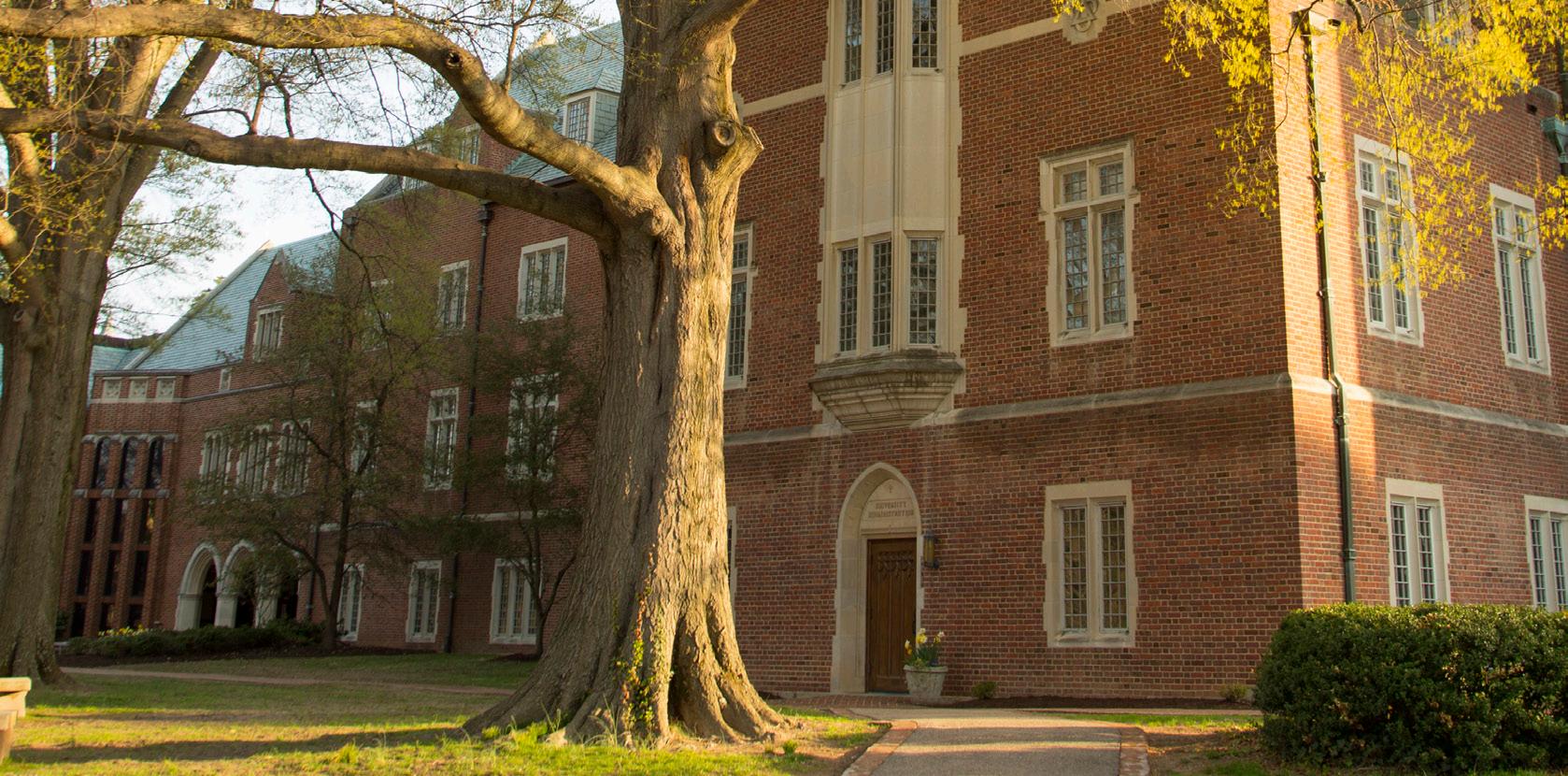
“We work together with students to form individualized approaches to refine learning skills and increase efficiency,” said Roger Mancastroppa, associate director at the Academic Skills Center. “We also help them review their executive functioning skills and identify areas for growth in managing time, self, assignments, and other aspects of their lives holistically, encouraging the greatest opportunity for growth as a person, not just a student.”
For more information, visit asc.richmond.edu or contact a member of its staff directly.
AROUND
15
THE LAKE
“What we’re trying to do is create an environment where they feel comfortable trying.”

16
VISUAL LEADERS
“The program in Visual and Media Arts Practice at UR is a gold mine, and sadly, many people on campus don’t know about it,” said Jeremy Drummond, associate professor of art and VMAP coordinator (left).

Its 15 specialized studios and labs are dedicated to drawing, painting, sculpture, printmaking, photography, and time-based media (animation, film, sound, and video), making it one of the premier facilities of its kind for liberal arts colleges and universities. Couple that with internationally recognized faculty, and it’s a recipe for success. VMAP alumni include acclaimed artists, designers, media producers, architects, graphic novelists, and other arts professionals at leading institutions, such as the Museum of Modern Art.
“We live in a world that throughout human history has only become increasingly visual,” Drummond said. “We need better images, more ethical images — images that challenge us to ask questions, to consider nuances, to think critically, and to put humanity and the planet on a better trajectory for the future. The Visual and Media Arts Practice program prepares students to be ethical, creative, and innovative leaders who will determine the future of our visual and media culture.”
17 PEOPLE
See more accomplishments and submit your own grant, publication, or honor at richmond.edu/ faculty-staff.
OUR ACCOMPLISHMENTS
FRANK ABUMERE, Zuzana Simoniova Cmelikova Visiting International Scholar at the Jepson School of Leadership Studies, published African Identities and International Politics (Routledge) and Normativity in African Regional Relations (Rowman & Littlefield). Abumere co-published Migration from Nigeria and the Future of Global Security (Palgrave Macmillan).
ADAM BARTLETT, HVAC team leader, received University Facilities’ CHEERS (Co-workers Honoring Excellent Employees with Rewards) Award. Winners are selected from a pool of peer-submitted nominees.
KRISTIN BEZIO, associate professor of leadership studies, published The Eye of the Crown: The Development and Evolution of the Elizabethan Secret Service (Routledge). Bezio also published “Single-Player Videogames in Leadership Learning” in New Directions for Student Leadership.
DAVID BRANDENBERGER, professor of history and global studies, published “Global in Form, Soviet in Content: The Changing Semantics of Internationalism in Official Soviet Discourse, 1917–1991” in The Russian Review and “Stalin and the Silences of the Official History of His Role in the Prerevolutionary Bolshevik Underground” in Revolutionary Russia.
CINDY BUKACH, MacEldin Trawick Professor of Psychology, published “Face Processing Still Predicts Reading Ability: Evidence from Developmental Prosopagnosia” in Cortex.
ELENA CALVILLO, associate professor of art history, published the chapter “Friendship, Medium and the Diverging Lives of Sebastiano del Piombo and Michelangelo” in Sebastiano del Piombo and Michelangelo: The Compass and the Mirror (Brepols).
DAN CHEN, assistant professor of political science, published “One Step Ahead of the Game” in Index on Censorship
VOLHA CHYKINA, assistant professor of leadership studies, published “Pro-integration policies and the occupational expectations of immigrant youth” in the International Journal of Comparative Sociology.
TOM COSSE, associate dean for international business programs, was elected to the steering committee of the Latin American Council of Management Schools, an international organization that reunites higher education
institutions and international organizations committed to the teaching and research of management.
MARIAMA REBELLO DE SOUSA DIAS, assistant professor of physics, co-published “Leveraging Machine Learning to Harness Non-Parabolic Effects in Semiconductor Heterostructures” in Physica E: Low-Dimensional Systems and Nanostructures.
KELLING DONALD, Clarence E. Denoon Jr. Chair in the Natural Sciences, in collaboration with undergraduate students, published “On Neutral Unsaturated Ouroboric Borylenes” in The Journal of Physical Chemistry A.

DELLA DUMBAUGH, professor of mathematics, co-published A History of Mathematics in the United States and Canada, Volume 2: 1900–1941 (American Mathematical Society).
DANA EL KURD, assistant professor of political science, was selected as a panelist with the Carnegie Middle East Center and the Foundation for Middle East Peace to discuss President Biden’s trip to the Middle East. El Kurd published the chapter “Mixed Methods Research” in Handbook of Research Methods in International Relations (Edward Elgar Publishing).
JOE FARIZO, assistant professor of finance, published “(Black)Rock the vote: Index funds and opposition to management” in the Journal of Corporate Finance.
JESSICA FLANIGAN, Richard L. Morrill Chair in Ethics & Democratic Values, published the chapter “Public Health and Health Care Policy” in The Routledge Companion to Libertarianism (Routledge). She also published the chapter “Deception and Sexual Harassment” in The Palgrave Handbook of Sexual Ethics (Palgrave Macmillan).
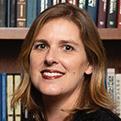
JAN FRENCH, associate professor of anthropology, published “Ethnography In-Sight: Spiraling through Fieldwork” and “Paint It Black or Red: Serious Play in Brazil’s Northeast” in The Journal of Latin American and Caribbean Anthropology.
GENGSONG GAO, associate professor of Chinese studies, published “Chinese Centrist Liberal Critics of Trump: A Reconsideration of Contemporary Chinese Liberalism” in the Journal of Current Chinese Affairs
JANE GEANEY, professor of religious studies, published The Emergence of Word-Meaning in Early China: Normative Models for Words (SUNY Press).
18
JERRY GILFOYLE, Robert Edward and Lena Frazer Loving Chair of Physics, published “Electron-Beam Energy Reconstruction for Neutrino Oscillation Measurements” in Nature.
AL GOETHALS, professor of leadership studies, received the International Leadership Association’s Lifetime Achievement Award.
KRISTINE GRAYSON, associate professor of biology, received a $116,800 grant — her fourth year of funding — from the United States Department of Agriculture’s Animal and Plant Health Inspection Service for “Research and Development on a Rearing System for Emerald Ash Borer.”
DIETER GUNKEL assistant professor of historical linguistics, published “The First Person Singular of the Athematic Middle Optative in Vedic and Indo-Iranian” in the Journal of the American Oriental Society. Gunkel also presented “Evidence for and Against Stress Regulation in Tocharian Meter” at the University of Vienna and “Rigvedic *aśiya, *aśiya, *rāsiya and the Development of PIE *-ih1-h2e into IndoIranian” at Cornell University.
JEFFREY HASS, associate professor of sociology, was selected a co-winner of the American Sociological Association Section on Peace, War, and Social Conflict’s 2022 Book Award and received an honorable mention for ASA’s Distinguished Scholarly Book Award for Wartime Suffering and Survival: The Human Condition under Siege in the Blockade of Leningrad, 1941–1944 (Oxford University Press).
MEGHAN HARRIS, associate vice president, joined Leadership Metro Richmond’s Leadership Quest Class of 2023. LMR is a community leadership development and engagement organization with a mission to strengthen the region by connecting diverse leaders and preparing them to serve.
CHRISTINE HELMS, associate professor of physics, and an undergraduate student published “Labeling fibrin fibers with beads alter single fibrin fiber lysis, external clot lysis, and produce large fibrin aggregates upon lysis” in Blood Coagulation & Fibrinolysis.
DANIEL HOCUTT, web manager in the School of Professional & Continuing Studies, co-published “Writing Infrastructure with the Fabric of Digital Life Platform” in the first of two special issues on communication design and infrastructures in Communication Design Quarterly.
CRYSTAL HOYT, Col. Leo K. and Gaylee Thorsness Endowed Chair in Ethical Leadership, co-published “Stereotypic Beliefs Contribute to Gender Disparities in the Field of Economics” in The Journal of Social Psychology and “Coping
in the time of COVID-19: Mindsets and the stories we tell” in the Journal of Applied Social Psychology. Hoyt and Laura Knouse, associate professor of psychology, published “A systematic review and meta-analysis of growth mindset interventions: For whom, how, and why might such interventions work?” in Psychological Bulletin
KATHRYN JACOBSEN, William E. Cooper Distinguished University Chair, published the chapter “An Epidemiological Perspective on Historic and Emerging Pandemics” in A Multidisciplinary Approach to Pandemics: COVID-19 and Beyond (Oxford University Press). Jacobsen also published “Anxiety and School Absenteeism Without Permission Among Adolescents in 69 Low- and Middle-Income Countries” in Dialogues in Health.
ELIZABETH KISSLING, associate professor of Spanish and applied linguistics, published “From Rule-Based Explicit Instruction to Explicit Knowledge: A Pilot Study on How L1 English Speakers Interpret Pedagogical Rules about Spanish Preterite and Imperfect” in Instructed Second Language Acquisition and “Exploring Boundedness for Concept-Based Instruction of Aspect: Evidence from Novice L1 English Speakers Learning the Spanish Preterite and Imperfect” in The Modern Language Journal.
LAURA KNOUSE, associate professor of psychology, copublished “Usability and Feasibility of a Cognitive-Behavioral Mobile App for ADHD in Adults” in PLOS Digital Health. Knouse and Crystal Hoyt, Col. Leo K. & Gaylee Thorsness Endowed Chair in Ethical Leadership, published “A systematic review and meta-analysis of growth mindset interventions: For whom, how, and why might such interventions work?” in Psychological Bulletin.
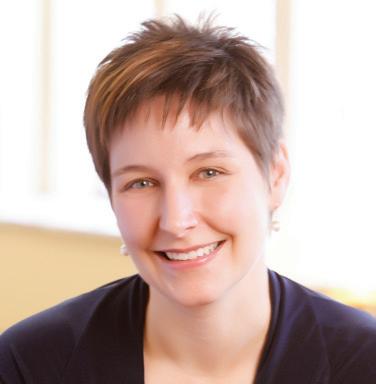
KAREN KOCHEL, associate professor of psychology, published the chapter “Can Friends Also Be Foes?” in Peer Relationships in Classroom Management: Evidence and Interventions for Teaching (Routledge) and “Empirically Derived Psychological Profiles of College Students: Differential Associations with COVID-19 Impact and Social Adjustment” in Emerging Adulthood.
PAUL KVAM, professor of statistics, co-published Nonparametric Statistics with Applications to Science and Engineering with R (Wiley).
MATTHEW LOWDER, assistant professor of cognitive psychology, published “Relative Clause Effects at the Matrix Verb Depend on Type of Intervening Material” in Cognitive Science.
THOMAS MANGANARO, assistant professor of English, was awarded the Walker Cowen Prize for outstanding work of scholarship in 18th-century
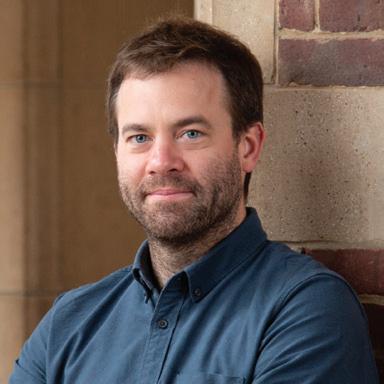
19 PEOPLE
2022 Custodial Award Winners
These annual University Facilities awards recognize individuals who have gone above and beyond in demonstrating the custodial commitments — safety, hospitality, quality, and efficiency.

CUSTODIAL SAFETY AWARD
Champions safety through their actions and commitment to themselves, their fellow staff, and the entire UR community
DEARDRE COLEMAN, TEAM LEADER
CUSTODIAL HOSPITALITY AWARD
Demonstrates a positive attitude and an ability to build lasting relationships
MARY OTTO, CUSTODIAN
CUSTODIAL QUALITY AWARD
Displays exemplary attention to detail and exceptional service CASSANDRA HARTRIDGE, CUSTODIAN
CUSTODIAL EFFICIENCY AWARD
Displays creative thinking, provides innovative suggestions, and continually seeks ways to improve the operation
DAMYAN DAMYANOV, RETHINK WASTE ASSOCIATE
CUSTODIAL COMMITMENT AWARD
Most exemplifies all four commitments of the custodial department GORDANA SIPOSOV, CUSTODIAN
CUSTODIAL LEADERSHIP AWARD
Demonstrates dedication to the team’s success, develops those around them, and serves those they lead
ED JONES, TEAM LEADER
studies for his book Against Better Judgment: Irrational Action and Literary Invention in the Long Eighteenth Century (University of Virginia Press).
MARUTI MISHRA, Trawick Postdoctoral Fellow in Psychology, was awarded a scholarship and travel award from the National Science Foundation to attend the 2022 ERP Bootcamp at the Center for Mind and Brain and a travel scholarship to present work at the Psychonomic Society’s 2022 Leading Edge Workshop. Mishra published “Not so fast! Response times in the computerized Benton Face Recognition Test may not reflect face recognition ability” in Cognitive Neuropsychology and was selected as a board member for the Vision Science Student Postdoc Advisory Committee, part of the Annual Vision Science Society meeting.
KEITH “MAC” MCINTOSH, vice president for information services and chief information officer, received the 2022 Educause DEI Leadership Award for promoting and advancing diversity, equity, and inclusion.
BRITTANY NELSON, assistant professor of photography, presented her work in a solo exhibition, “Meet Me At Infinity,” showing at Fotogalleriet in Oslo, Norway.
BRANDON NG, visiting assistant professor of psychology, published “Over-Rating Pain is Overrated: A Fundamental Self-Other Bias in Pain Reporting Behavior” in The Journal of Pain.
MICHAEL NORRIS, assistant professor of chemistry, and Julie Pollock, associate professor of chemistry, in collaboration with undergraduate students, published “Unravelling the role of [Ru(bpy)2(OH2)2]2+ complexes in Photo-Activated Chemotherapy” in the Journal of Inorganic Biochemistry. Norris and undergraduate students published “SixElectron CO2 Reduction Involving Participation by Benzimidazole-Derived Bidentate Ligands in Ruthenium Complexes” in ACS Applied Energy Materials.
CAROL PARISH, Floyd D. and Elisabeth S. Gottwald Professor of Chemistry and associate provost for academic integration, published “Words Matter: On the Debate over Free Speech, Inclusivity, and Academic Excellence” in The Journal of Physical Chemistry Letters.
JULIE POLLOCK, associate professor of chemistry, was awarded a National Institutes of Health research enhancement grant with professors at High Point University for “Use of a novel tricyclic Stk1 inhibitor to uncover molecular mechanism in clinically relevant strains of S. aureus.” Pollock and Michael Norris, assistant professor of chemistry, in collaboration with students, published “Unravelling the role of [Ru(bpy)2(OH2)2]2+ complexes in Photo-Activated Chemotherapy” in the Journal of Inorganic Biochemistry.
20
CYNTHIA PRICE, associate vice president of media and public relations, was selected to join Leadership Metro Richmond’s Leadership Quest Class of 2023. LMR is a community leadership development and engagement organization with a mission to strengthen the region by connecting diverse leaders and preparing them to serve.
BILL ROSS, Roger Francis and Mary Saunders Richardson Chair in Mathematics, published “Zeros of polynomial approximants in lAp” in Advances in Mathematics.
CHRISTOPHER VON RUEDEN, associate professor of leadership studies, published “Unmaking egalitarianism: Comparing sources of political change in an Amazonian society” in Evolution and Human Behavior.
TOM SHIELDS, associate dean of academic and student affairs in the School of Professional & Continuing Studies, co-presented “Socioeconomic Issues in School Boundary Lines and Redistricting” during a Friday lunch series on redistricting in politics and government that was organized by Dave Soule, visiting lecturer of economics in the Robins School of Business.
SAMANTHA SEELEY, associate professor of history, received the 2021 Jon Gjerde Book Award from the Midwestern History Association for Race, Removal, and the Right to Remain: Migration and the Making of the United States (Omohundro Institute and University of North Carolina Press). The prize recognizes the year’s best book on Midwestern history.
JACK SINGAL, associate professor of physics, published “Can the Distance-Redshift Relation Be Determined from the Correlations Between Luminosities” in Astrophysical Journal Letters and “Machine Learning Classification to Identify Catastrophic Outlier Photometric Redshift Estimates” and “The X-Ray Luminosity Function Evolution of Quasars and the Correlation between the X-Ray and Ultraviolet Luminosities” in The Astrophysical Journal. Singal delivered a public talk, “All the Light in the Universe,” at Triple Crossing Fulton Brewery as part of the Profs and Pints lecture series and “Alien Life and UFOs — The Scientific View” at Stanford University.
STEPHANIE SPERA, assistant professor of geography, environment, and sustainability, was selected as one of 40 scientists to participate in the American Geophysical Union’s 2022–23 Voices for Science cohort.
TRICIA STOHR-HUNT, assistant professor of elementary education, was elected president of the Virginia Association of Colleges and Teacher Educators.
YÜCEL YANIKDAĞ, professor of history and global studies, was awarded a Fulbright-Hays Faculty Research Abroad Fellowship for Making and Remaking Men in a ‘Military Nation’: Masculinity, Emotions, and Identity in the Ottoman First World War
The following highlights employment status changes for full- and part-time faculty and staff — including temporary to full- or part-time positions — from July 1 to Oct. 31, 2022.
NEW HIRES
FACULTY
SCHOOL OF ARTS & SCIENCES
CLASSICAL STUDIES
Chris Motz Visiting Assistant Professor of Classical Studies
GEOGRAPHY AND THE ENVIRONMENT
Kyle Redican Spatial Analysis Lab Director
HEALTH STUDIES
Tyana Ellis Visiting Assistant Professor of Health Studies
HISTORY
Jillean McCommons Assistant Professor of History and Africana Studies
LANGUAGES, LITERATURES, AND CULTURES
Catherine Adoyo Visiting Assistant Professor of Italian Studies
Yukiko Kadekawa Teaching Fellow in Japanese
Dana Shalash Visiting Assistant Professor of Arabic Studies
LATIN AMERICAN, LATINO, AND IBERIAN STUDIES
Laura Fernandez Assistant Professor of Latin American, Latino, and Iberian Studies
MATHEMATICS AND STATISTICS
Kay Brooks Visiting Instructor in Mathematics
Catherine Finegan-Dollak Assistant Professor of Computer Science
Lilla Orr Assistant Professor of Data Science and Statistics
MUSIC
Stefan Greenfield-Casas Visiting Assistant Professor of Music
Leyla McCalla Artist-In-Residence
PHILOSOPHY
H Bondurant Visiting Assistant Professor in Philosophy and Philosophy, Politics, Economics, and Law
PHYSICS
William Hodge Director of Introductory Physics
PSYCHOLOGY Arryn Robbins Assistant Professor of Psychology
Shelby Smout Postdoctoral Research Assistant
RHETORIC AND COMMUNICATION STUDIES
Greg Cavenaugh
Visiting Assistant Professor of Rhetoric and Communication Studies
Ravynn Stringfield
Visiting Assistant Professor of Rhetoric and Communication Studies
Justin Wigard Postdoctoral Research Assistant
SOCIOLOGY AND ANTHROPOLOGY
Chris Mowery Visiting Assistant Professor of Sociology
Olubukola Olayiwola Visiting Assistant Professor of Anthropology
Erfan Saidi Moqadam Visiting Lecturer in Anthropology
THEATRE AND DANCE OPERATIONS
Jason Ammons Visiting Assistant Professor of Scenic Design
ROBINS SCHOOL OF BUSINESS
Eli Bank Executive in Residence
Grace Mittl Business Adjunct Faculty
ECONOMICS
Durga Gautam Visiting Lecturer
Taylor Weidman Visiting Instructor
Matthew Wilson Visiting Lecturer
FINANCE
Summer Liu Assistant Professor of Finance
Nancy Tran Assistant Professor of Finance
MANAGEMENT
Marina Astakhova Associate Professor of Management
21 PEOPLE
Patricio Duran
Associate Professor of Management
Christine Mihelcic Assistant Professor of Management
Michelle Montague-Mfuni
Assistant Professor of Management
Tenace Setor Assistant Professor of Analytics and Operations
SCHOOL OF LAW
Vincent Chiao Haynes Professor of Interdisciplinary Studies
Marissa Jackson Assistant Professor of Law
Danielle Wingfield Assistant Professor of Law
STAFF
ACADEMIC AFFAIRS
SCHOOL OF ARTS & SCIENCES
Claire Bjorkholm Administrative Specialist, Modlin Center for the Arts
Corey Brown Assistant Production Manager, Modlin Center for the Arts
Jenny Cavenaugh Dean
Bri Conley Assistant Production Manager, Modlin Center for the Arts
Kaleigh Crowgey Academic Administrative Coordinator, Military Science
Augusta Donaldson Education Studio Associate
Shawanna Hall Front of the House Coordinator, Modlin Center for the Arts
Justin Lee Accompanist, Music
Destiny Pacella Post-Baccalaureate Fellow, Biology
Logan Rakes Post-Baccalaureate Research Assistant, Biology
Samantha Salters Box Office Manager, Modlin Center for the Arts
Barb Schaible
Academic Administration Coordinator, Dean’s Office
Perrin Turner
Wood, Metal, Technology Lab Technician, Art and Art History
ROBINS SCHOOL OF BUSINESS
Jessie Bailey
Assistant Director for Recruiting, Admissions, and Student Services, MBA Programs
Nora Kostyk Administrative Coordinator, Dean’s Office
Erica Long Special Events Coordinator, Dean’s Office
SCHOOL OF LAW
Demetria Dailey Assistant Director of Admissions
Lauren Jordan Associate Director of Admissions
Will Thompson Administrative Coordinator, Dean’s Office
SCHOOL OF PROFESSIONAL AND CONTINUING STUDIES
Tom Parfitt Senior Program Manager, Continuing Studies NonCredit
PROVOST
Emily Ball
Administrative Coordinator, Student Success Center
Katie Dessent
Library Resource Sharing Specialist, Boatwright Memorial Library
Janet Groessler
Executive Assistant to the Executive Vice President and Provost
Somiah Lattimore Director of Creativity, Innovation, and Entrepreneurship
Aaliyah McLean
Equity and Community Fellow for Events and Communications, Bonner Center for Civic Engagement
Zach Perry Assistant Debate Coach
ADVANCEMENT
Ian Beckstead Gift Planning Officer, Gift Planning
Hannah Bell Employer Relations Coordinator, Career Services
Ari Emanuel-Wright Assistant Director, Career Services
William Huesman
Leadership Gift Officer, Annual Giving
Jeanine Larson Director of Grant Support, Corporate, and Government Relations
Erika Minor Administrative Coordinator, Foundation, Corporate, and Government Relations
Jordan Smith Administrative Coordinator, Annual Giving
ATHLETICS
Jason Archbell Assistant Men’s Lacrosse Coach
Dasnii Curtis Associate Director of Academic Support/ Director of Football Academic Performance
Emily Dunbar Associate Women’s Tennis Coach
Jacob Dunbar Associate Men’s Tennis Coach
Claire Evko Marketing Assistant, Game Day Experience
Andrew Goe Head Women’s Diving Coach
Cody Gray Defensive Assistant, Football
Brandon Hardy Intern Academic Aide
Caden Highfield Ticket Office Assistant
Jaide Hinds-Clarke Coordinator of StudentAthlete Leadership Development and Engagement
Brandon Hodgins
Associate Athletics Director for Development, Spider Athletic Fund
Amber Martin Intern Assistant Athletic Trainer, Sports Medicine
Emily McNamara
Creative Content and Social Media Manager, Game Day Experience
Kirsten Nieuwendam Assistant Cross Country and Track and Field Coach
Shea Nolan
Assistant Director of Athletic Equipment Operations
Isabel Rose
Associate Director of Academic Support
Jalynn Spaulding Athletics Leadership Intern, Student-Athlete Leadership Development
Kieran Thayer Assistant Strength & Conditioning Coach
BOARD OF TRUSTEES Hilary Robinson Project Coordinator
BUSINESS AFFAIRS
Maria O’Callaghan Senior Associate Vice President of Campus Operations
Maribel Street Director, Emergency Management
CAMPUS OPERATIONS
Billie Afflick Floater Manager, Heilman Dining Center
Maddie Antigha Café Associate, 8:15 at Boatwright
Merveille Apanga Custodian, University Facilities
Brian Argalas Electrician II, University Facilities
Braden Bean Event Manager, Catering
James Boyd Groundskeeper, University Facilities/Landscape
Robert Branch Custodian, University Facilities
Amazin Bullock Café Associate, Passport Café
Elijah Cox Cook II, Heilman Dining Center
Jaymie Cushing Cook II, Heilman Dining Center
Luis Davila Caballero Utility Associate, Organic Krush
Landen Dodge Cook II, Heilman Dining Center
Kyle Donovan HVAC Mechanic II, University Facilities
Cameron Dunlap Utility Associate, Heilman Dining Center
Terrance Gibson Utility Associate, Heilman Dining Center
Deon Givens Cashier, ETC
Joe Glass Cook, The Cellar
Liz Goodwyn Floater Manager, Heilman Dining Center
Irvin Griffin Cook II, Heilman Dining Center
Treda Hill Cashier, Heilman Dining Center
Sayed Akaber Hussaini Custodial Support Associate, University Facilities
Tony Jefferson Utility Associate, Heilman Dining Center
Telisi Johnson Project Designer, University Facilities/ Architectural
Matthew Karfakis Senior Catering Chef
Shelby Kelly Café/Stores Associate, Organic Krush
James Kent Events and Projects Technician, Events, Conferences, and Support Services
Caroline Kirkland Director, Events, Conferences, and Support Services
Raya Kuzupas Café Associate, Organic Krush
Eric Lee Groundskeeper, University Facilities/Landscape
Lloyd Morris
Line Service Associate, Heilman Dining Center
Tina Morris Line Service Associate, Heilman Dining Center
Typriece Morris
Line Service Associate, Heilman Dining Center
Shomari Obiekwe Cook I, Heilman Dining Center
Martin Pillow Energy Management System Controls Technician I, University Facilities
Adrian Price Cold Food Production Cook Lead, Heilman Dining Center
22
2022 Engage for Change Award Winners

These awards, given annually by the Bonner Center for Civic Engagement, celebrate and acknowledge faculty, staff, students, and area leaders working together to make an impact in our communities.
COMMUNITY-ENGAGED TEACHING AWARD
Recognizes a faculty member who has consistently demonstrated excellence in community-engaged teaching at the University of Richmond
MAIA LINASK
Associate Professor of Economics
COMMUNITY-ENGAGED SCHOLARSHIP AWARD
Recognizes a faculty member — or members — whose scholarly and/or other creative activity emerges from a mutually beneficial partnership with a community and creates new knowledge that contributes to positive social change
KAREN
KOCHEL
Associate Professor of Psychology
CHUCK MIKE
Associate Professor of Theatre
COLLABORATION FOR CHANGE AWARD
Honors a collaborative community-based partnership between campus and community stakeholders
CONCERNED CITIZENS OF CHARLES CITY COUNTY (C5)
MARY FINLEY-BROOK
Associate Professor of Geography and the Environment
CONTRIBUTION TO THE INSTITUTION AWARD
Recognizes faculty or staff whose community-engaged teaching, scholarship, and/or service made a significant contribution to the University of Richmond, furthering opportunities for faculty engagement, community collaboration, and the learning and thriving of our students
HOLLY BLAKE
Director, will Program, and Associate Dean for Outreach Education and Development, Westhampton College
BILL COLEMAN AWARD
Recognizes a staff member who is dedicated to supporting meaningful engagement with our local and global communities
ALLISON MOYER
Associate Director, Landscape Services
LEARN MORE
For a complete list of winners, visit engage. richmond.edu/events/ awards.
23 PEOPLE
Liz Prillaman
Administrative Assistant, Campus Services
Adam Schumm
Chef Production Manager, Heilman Dining Center
Jasmine Shaw Cook I, Heilman Dining Center
Kevin Sikes
Events and Projects Technician, Events, Conferences, and Support Services
Andre Smith Utility Associate, Heilman Dining Center
Chris Sullivan Electrician II, University Facilities/Electrical
Avonna Taylor Line Service Associate, Heilman Dining Center
Leah Taylor Cashier, ETC
Sarah Tofani Cook I, Tyler’s Grill
Campbell Tucker Lead Cook, Heilman Dining Center
Lakeisha Whitehead Utility Associate, Heilman Dining Center
Fotini Williams Assistant Director of Catering
Rob Williamson Catering Driver
Dominic Wol Utility Associate, Heilman Dining Center
HUMAN RESOURCES
Tommy Harvey Compensation Specialist
Tom Schram Manager of Compensation
SECURITY Davan Guyton Police Officer
Christy Rayas Ramirez Communications Officer, Campus Safety
Nathaly Villalobos Communications Officer, Campus Safety
COMMUNICATIONS
Tom Addonizio Vice President for Communications and Marketing
Megan Condict Director of Multimedia
Terrance Henderson Director of User Experience
ENROLLMENT MANAGEMENT
Linda Gutenberger
Administrative Specialist, Undergraduate Admission
Mallory Haskins Visit Coordinator, Undergraduate Admission
Marilyn Hesser Interim Associate Vice President and Dean of Admission, Undergraduate Admission
Elizabeth Hunter Assistant Director of Admission, Undergraduate Admission
Ethan Knight Associate Director, Office of Scholars and Fellowships
Michelle Trent Administrative Coordinator, Undergraduate Admission
INFORMATION SERVICES
Cory Anderson Senior Programmer Analyst, Administrative Systems
Bob Baskette Information Security Analyst
Holly Clark Technical Support Analyst, User Services Specialists
Matt Duesing Multimedia Specialist, Telecommunications and Media Support Services
Mathew Jean-Baptiste Multimedia Specialist, Telecommunications and Media Support Services
Bobby Paxton Director of Web Services
LEGAL AND COMPLIANCE
Liz Burneson Assistant General Counsel
PLANNING AND POLICY
Marija Vjestica Student Services Coordinator, Registrar’s Office
PRESIDENT Amy Atticks Senior Writer
SPIDER MANAGEMENT
Rebecca Fender Director, Investor Relations
STUDENT DEVELOPMENT
Casey Butler Associate Director, LGBTQ Campus Life, Student Center for Equity & Inclusion
Michael Clifford WDCE Station Manager, Center for Student Involvement
Lian Currie Staff Counselor, Counseling and Psychological Services
Taylor Hoogsteden Assistant Director of Programming, Center for Student Involvement
AJ Johnson Facility Supervisor, University Recreation
Karrie Kapsak
Associate Director, Student Centers and Operations, Center for Student Involvement
Maria Lapins Administrative Specialist, Richmond College Dean’s Office
Amber Livingston Staff Counselor, Counseling and Psychological Services
Linh Ly Employment Coordinator, Health and Well-Being Operations
Jordan Markland Fitness Assistant, University Recreation
Mary Anne Messer Staff Counselor, Counseling and Psychological Services
Sage Ober Associate Director, New Student and Transition Programs
Madeline Pope Operations Coordinator, Health and Well-Being Operations
Solomon Simon Massage Therapist, Health Promotion
Ray Trac Assistant Dean of Richmond College
MOVES
FACULTY
SCHOOL OF ARTS & SCIENCES
CHEMISTRY
Miles Johnson Associate Professor of Chemistry
JOURNALISM
Thomas Kapsidelis Visiting Assistant Professor of Journalism
LANGUAGES,
LITERATURES, AND CULTURES
Leslie Bohon-Atkinson Director of English Language Learning
Gengsong Gao Associate Professor of Chinese Studies
Hilary Raymond Visiting Lecturer of Languages, Literatures, and Cultures
Caroline Weist Associate Professor of German Studies
PSYCHOLOGY
Kristjen Lundberg Associate Professor of Psychology
UNIVERSITY MUSEUMS
Richard Waller Senior Curator
SCHOOL OF LAW
Ashley Dobbs Clinical Professor of Law
Dave Johnson Visiting Assistant Professor of Law STAFF
ACADEMIC AFFAIRS
SCHOOL OF ARTS & SCIENCES
John Steele Assistant Museum Preparator, University Museums
Liza Williams Academic Employment Manager, Dean’s Office
SCHOOL OF LAW
Brandon Metheny Director of Admissions
PROVOST
Chad Devers
Full Stack Library Solutions Engineer, Boatwright Memorial Library
Brittany Schaal Director of Operations
ADVANCEMENT
Janae Driver Assistant Director of Employer Relations, Career Services
24
Christin Harris
Assistant Director of Advancement Data Solutions and Training, Advancement Systems
Emily Janto
Assistant Director of Advancement Operations, Advancement Systems
ATHLETICS
Jason Vida
Assistant Athletics Director for Communications
BUSINESS AFFAIRS CAMPUS OPERATIONS
Noel Brooking Electrician I, University Facilities
Caitlin Brusoski
Athletic Field Technician, University Facilities/ Landscape
Michael Carpenter Events Technician, University Facilities/ Electrical
Matt Chubb Cook II, The Cellar
Julian Cline Plumber, University Facilities
Matbien Deng Team Leader, University Facilities/Custodial
Loida Domasig SpiderShop Merchandiser
Ray Donahoo
Assistant Director, Mail Services
Eric Estes
Project Engineer, University Facilities/ Architectural
Kolby Ferguson Custodian, Heilman Dining Center
Nathan Hucks Sous Chef, Catering
Adrian Hutcherson Utility Associate, Heilman Dining Center
Keisha Jefferson Banquet Captain, Catering
Randolph Jefferson Custodial Floor Technician, Heilman Dining Center
Gray Nance
Lead Stores Associate, Heilman Dining Center
James Newcomb Plumber, University Facilities
Angela Richardson
Assistant Director of Business Operations, University Facilities
Rick Richardson
HVAC Mechanic II, University Facilities
Ryan Sims Cashier, Heilman Dining Center
Jeff Smith
Assistant Director of Retail Operations, ETC
Ryan Strotman HVAC Mechanic I, University Facilities
Petar Vjestica Café/Stores Associate, Passport Café
Traci Wenzel
Assistant Director of Campus Planning, University Facilities/ Architectural
CONTROLLER
Karla Connelly Purchasing Specialist, Procurement and Strategic Sourcing
Du’Neika Easley Associate Vice President for Internal Audit
Lana Larsen Student Account Specialist
Cheryl Moss Accounting Specialist
SECURITY Jess Oliver Communications Center Supervisor
ENROLLMENT MANAGEMENT
Julie Du Pont
Senior Assistant Director of Admission, Undergraduate Admission
Amanda Gearheart
Associate Director of Admission, Undergraduate Admission
Priscilla Greene Senior Assistant Director of Admissions, Undergraduate Admission
Daesha Hordge
Senior Assistant Director of Admissions, Undergraduate Admission
INFORMATION SERVICES
Vickie Brady
Academic Computing Services Project Manager and Team Leader
PLANNING AND POLICY
Kimberlee Duren
Senior Transfer and Curriculum Analyst, Registrar’s Office
PRESIDENT
Nicki Pugh
Administrative Specialist
SPIDER MANAGEMENT
Megan DeMars Manager, Investment Operations
Sherry Knapp Analyst, Investment Operations
Ben Smith
Senior Analyst, Investments
Bill Spetrino
Associate Director, Investments
STUDENT DEVELOPMENT
Dani Roberts
Associate Director, Student Center for Equity and Inclusion
Zara Sibtain
Associate Dean of Westhampton College
Vittoria Tripp
Associate Director for Student Engagement, Center for Student Involvement
RETIREMENTS
39 YEARS
RICH MCDONALD University Facilities –Electrical
35 YEARS
MELANIE HILLNER Boatwright Memorial Library
31 YEARS
BEVERLY BRADSHAW Modlin Center for the Arts
29 YEARS
PAT FOBBS University Facilities –Custodial
24 YEARS
DAN ROBERTS Professional & Continuing Studies faculty
19 YEARS
MICHAEL DAHLEM Athletics
10 YEARS
LEE CHAHARYN Campus Services
IN MEMORIAM
Remembering those we lost in 2022
CINDY A. BLACKER JUNE 4, 2022
Academic Administrative Coordinator, Military Science and Leadership 11 YEARS OF SERVICE
25 PEOPLE
410 Westhampton Way
University of Richmond, VA 23173
MARK YOUR CALENDAR
FEBRUARY
Feb. 11
Employee Appreciation Day at the Robins Center
Men’s Basketball vs. Loyola Chicago Limited free tickets for faculty and staff
Feb. 17
Experience Richmond Open house for admitted students and their families
MARCH
March 3, 2–4:30 p.m. Employee Service Awards
Booker Hall of Music, Camp Concert Hall March 4–12
Undergraduate Spring Break
March 18
Experience Richmond March 24
Preview Richmond Open house for prospective students and their families
March 25, 9 a.m.
Spider Dash 5K
APRIL April 14
Experience Richmond April 21
Last Day of Undergraduate Spring Classes April 22
Experience Richmond
spiderinsider@richmond.edu.
USAC
The University Staff Advisory Council represents the needs of staff to senior administration and works to make the University of Richmond an employer of choice.
Meetings* Feb. 14 March 14 April 11 1–3 p.m.
Visit usac.richmond. edu for meeting locations.
FACULTY SENATE
The University of Richmond Faculty Senate represents the faculty in the University’s governance process on matters that impact the University or affect more than one school.
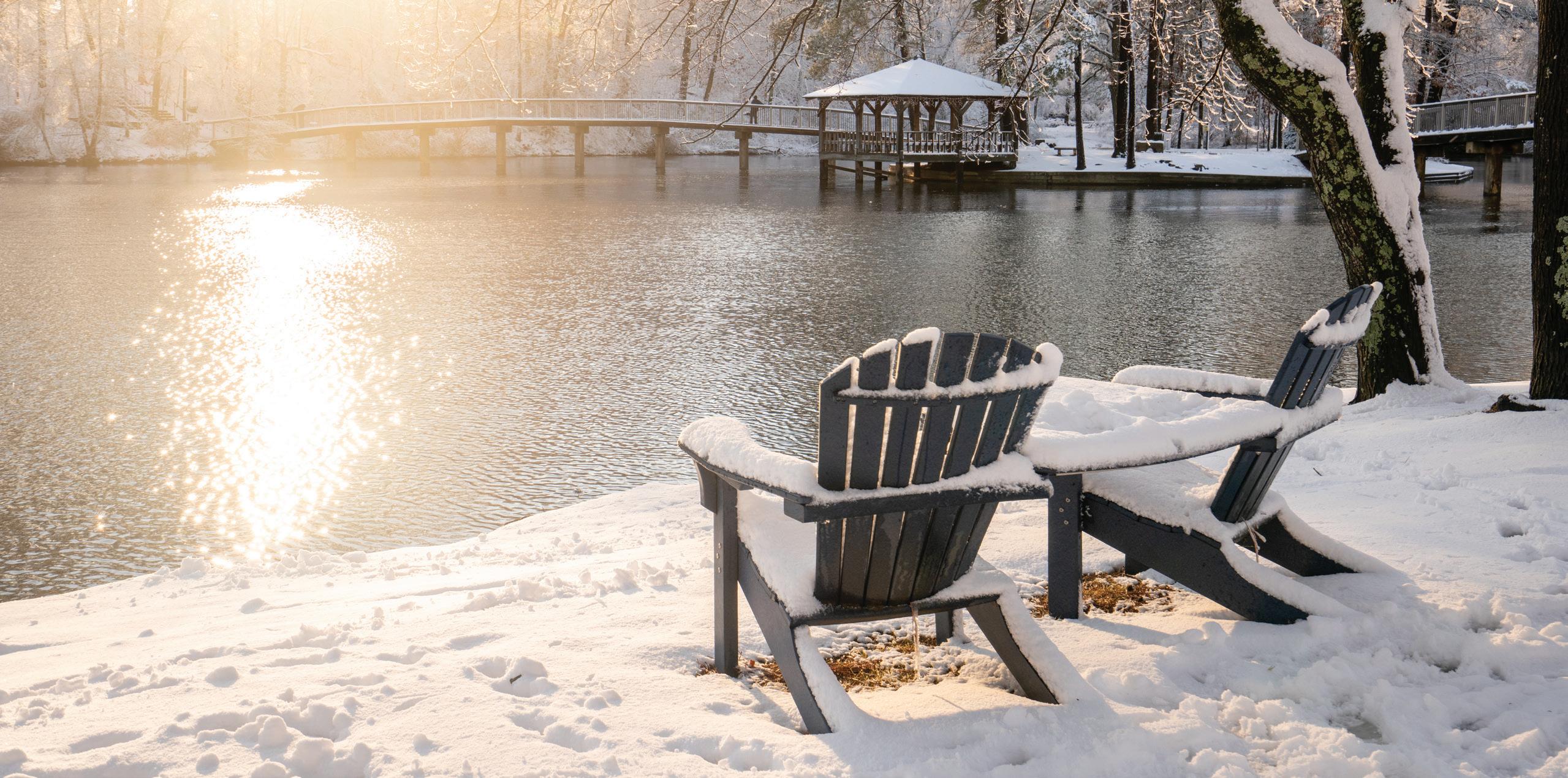
Meetings* Feb. 10 March 17 April 14 3–4:30 p.m.
Visit facultysenate. richmond.edu for meeting locations.
*Unless otherwise noted, meetings are open to all faculty and staff.
We welcome your input. Send your story ideas or comments
to





































